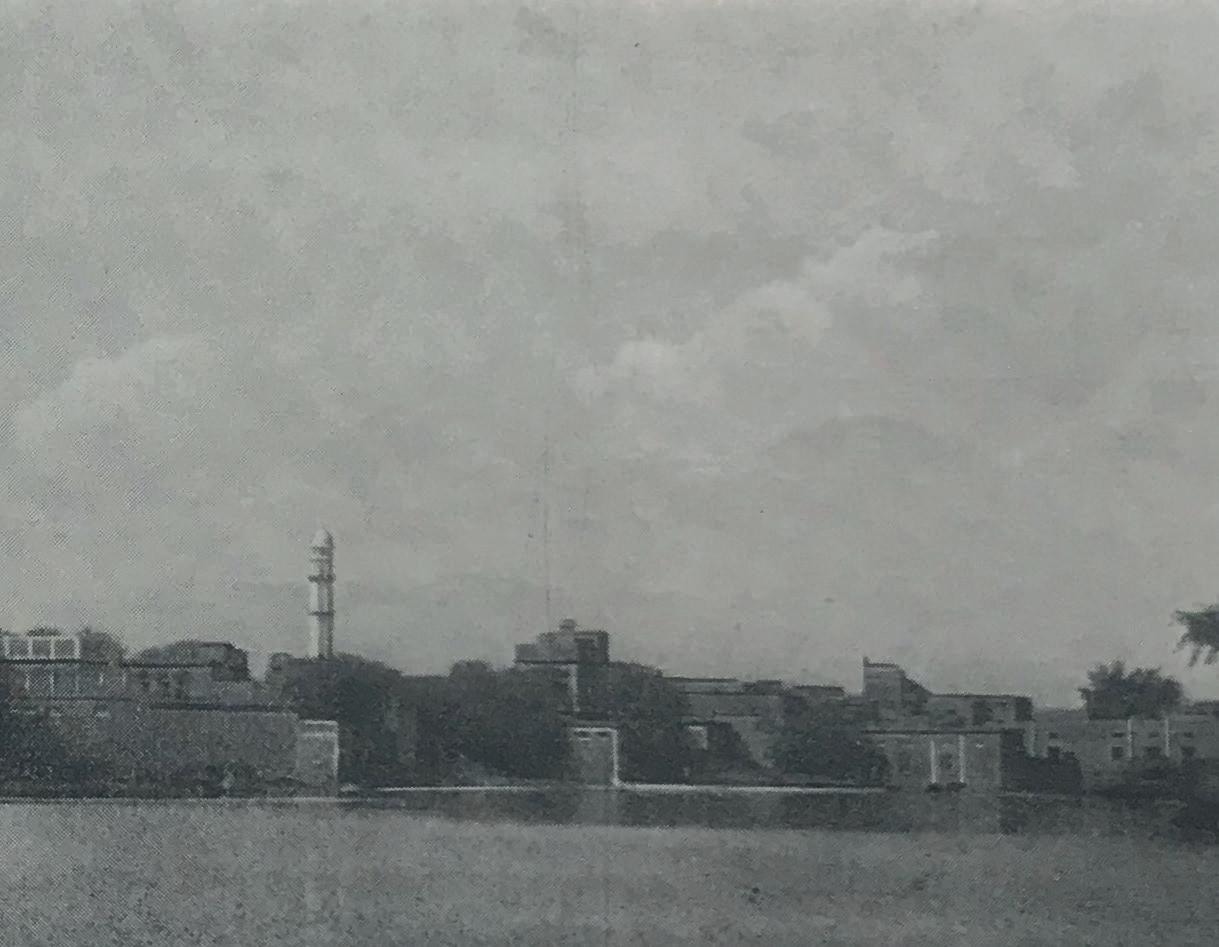‘We
must recognise the rights of every community’: Hazrat Musleh-e-Maud’s lecture at Bradlaugh Hall, Lahore
V
Ahmadi mothers should befriend their children and discuss faith with them:

‘We
must recognise the rights of every community’: Hazrat Musleh-e-Maud’s lecture at Bradlaugh Hall, Lahore
V
Ahmadi mothers should befriend their children and discuss faith with them:
At the beginning of the meeting, Hazrat Amirul Momineenaa asked if the amila members were sitting in Bait-ul-Mujeeb, the newly-built mosque in Brussels, to which Huzooraa was informed they were.
Hazrat Khalifatul Masihaa asked the General Secretary, Maryam Farhan Sahiba about the majalis and the total number of Lajna members in Belgium. Maryam Sahiba reported they had 14 majalis and a total of
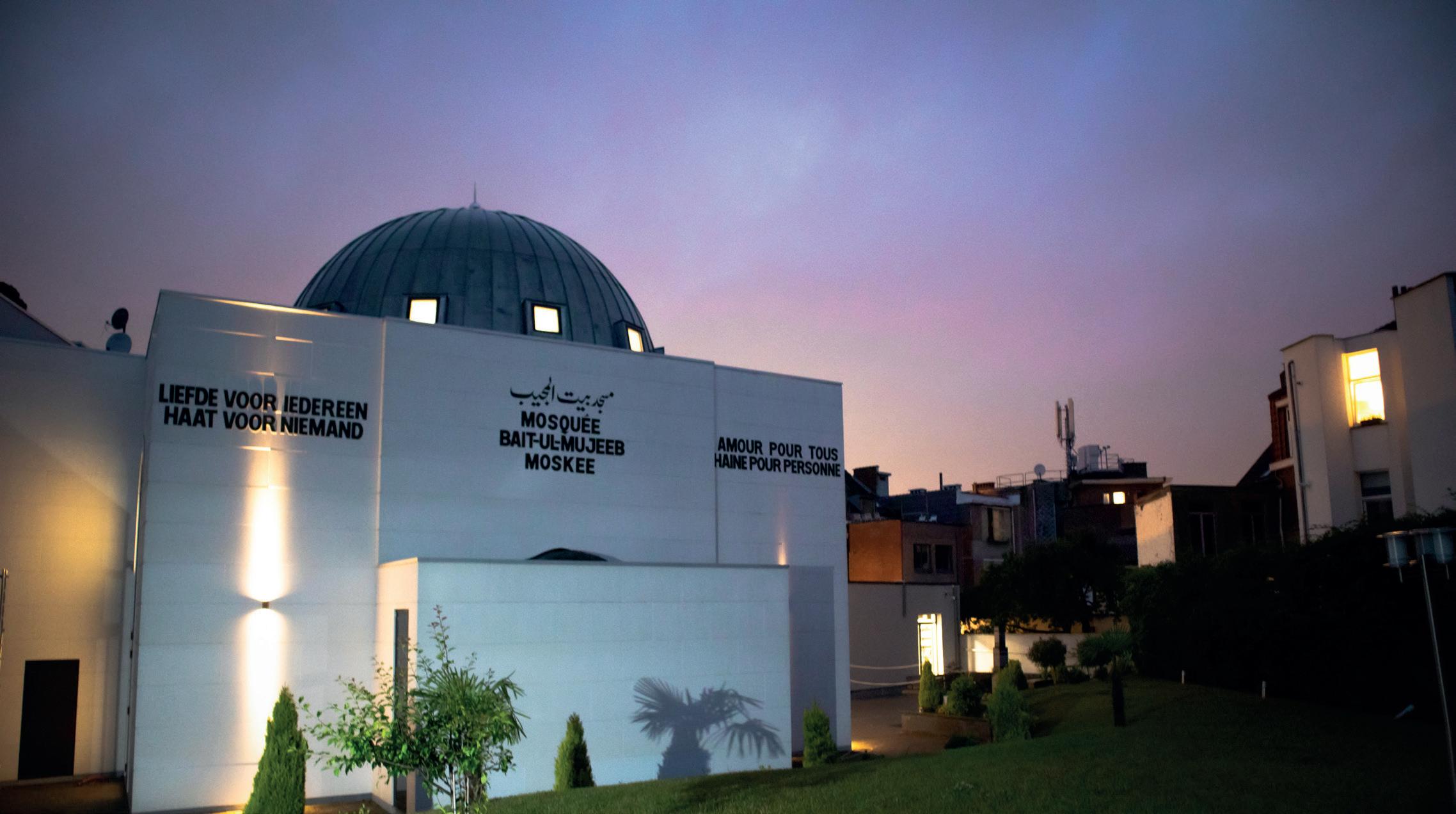
Qanita Hussain Sahiba reported she was serving in the talim department and in her report she said Lajna members were currently reading The Philosophy of the Teachings of Islam and The Philosophy of Divine Revelation. Huzooraa asked if both books had been translated into Flemish and French and whether members were being tested on their knowledge of the books.
Qanita Sahiba said they had been translated and annually a test at the national ijtema was held and tests on the books were also held every month.
Speaking with Naib Sadr Awwal, Amatul Shafi Irshad Sahiba, Huzooraa said the participation for chanda should be 100%. In her report, Amatul Shafi Sahiba informed Huzooraa that Lajna Imaillah Belgium did not have their own offices and that schemes were in place to raise funds for this, however, ultimately, they planned to purchase a property close to the markaz in Belgium with the help of Majlis Ansarullah Belgium. Hearing this, Hazrat Khalifatul Masihaa said Lajna Imaillah Belgium should “muster the strength” and purchase the office building on their own, without the help of Ansarullah.
Secretary Tabligh, Bushra Ehsan
11
Importance of the Friday prayer
Abul Ja‘d Ad-Damrira, a companion of the Holy Prophetsa, said that Allah’s Messengersa said:
“He
Hazrat Mirza Ghulam Ahmadas, In
“There is no doubt that if you did not possess a love for those filled with goodwill, why would you come to visit me? For why would a worldly man bother to visit someone who sits secluded in a corner away from the rest of the world? This requires an affinity of natures.
Page 12 Continued on next page >> Page
The Purpose of the advent of the Promised Messiah: To develop a living faith in the Living God
Lalah Keshudas, Tehsildar of Batala, coincidentally happened to visit Qadian and so he came to see the Promised Messiahas. He submitted to His Holiness that he was very fond of visiting holy men and it was due to this very desire that he had come to visit the Promised Messiahas. His Holiness said:
<< Continued from previous page
The fact of the matter is that when man is a mortal being, when there is no telling when death will arrive, and when life is transitory, how crucial it is for him to become constantly engaged in seeking his own reformation and prosperity. However, I observe that the people of the world are so obsessed in their own preoccupations, that they are not the least concerned or worried for the hereafter. They are becoming so indifferent towards God Almighty, that it is as if He did not exist at all. In these circumstances, when the state of the world is becoming so weak in faith, Allah the Exalted has appointed me and sent me so that I may show them the path which leads to a living belief in the Living God.
As is the general law of God, many
<< Continued from previous page
Sikundar Sahiba, was next to report. Hazrat Amirul Momineenaa asked for the tabligh plan for the year and whether an annual bai‘at target was in place for the lajna members to achieve. Huzooraa said:
“Your total strength is six-hundred and ninety-something, so if you make it half, your target should not be less than 340. […]
“If you give a target to each amila member of one bai‘at then at least you can achieve half of the target.”
Bushra Ehsan Sahiba said they had also planned to reach universities in Belgium and hold seminars to preach about Islam Ahmadiyyat. There was also a special team being formed that would focus on achieving the bai‘at target.
On the topic of preaching and how to preach, Hazrat Khalifatul Masihaa said:
“Normally, those who are well-educated people, they are just indifferent about religion. They don’t take much interest in religion. Although they discuss so many things with you – you feel that they are very much interested in religion – but in reality, they are not. So, you should also try to contact and focus on the general public. Try to find some pockets from among Arabs, local Belgians and some other Asians who are migrants here. So, try to focus on different ethnic groups and form your teams for different groups. For Arabs, a different team, for Asians, a different team, for local people, different teams. This is how you can achieve your target or you can at least spread the message.”
Speaking with Anum Arslan Sahiba, Secretary Tarbiyat, Huzooraa instructed:
“In your plans, also include a programme for teaching children about namaz. This is also the responsibility of mothers, that they monitor the namaz of their children, whether they are girls or boys. Include this in your programme as well.
“And have religious discussions with your children as well, so that they understand their religion. Tell mothers to have discussions with their children – if fathers aren’t interacting with their children, then at least the mothers should. As a result, this might persuade the fathers to do the
people who are deprived of good nature and guidance, who do not fear God and are bereft of a sense of justice, have declared me to be false and have named me a liar. They left no stone unturned in causing me grief and strove to harm me. They issued edicts of disbelief against me so that the Muslims would think ill of me and submitted false reports about me to the government to incite the authorities against me. They brought forth false lawsuits against me, cursed me and conspired to kill me. In short, what did they not do? But my God stands by my side at all times. He informed me in advance of their every scheme and revealed to me the final end of each. Ultimately, everything transpired exactly as God had informed me long ago.
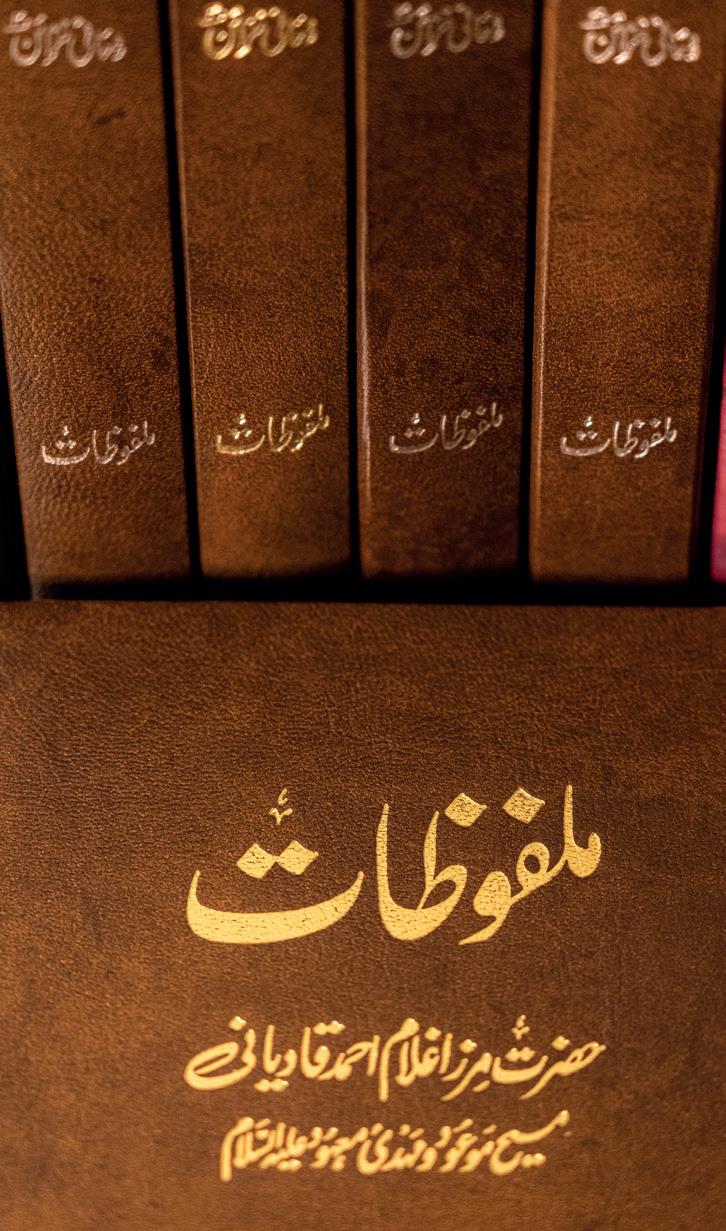
However, there are those who have been blessed with a good nature, fear
of God and the light of faith; those who recognised me and who flocked around me to partake of that light, which God has conferred upon me in the form of enlightenment and divine insight. These people include distinguished scholars, graduates, lawyers, doctors, honourable government officials, merchants, landlords and common people as well. It is unfortunate that our unworthy opponents cannot even bring themselves to at least listen calmly to the truth that I present. For they are empty of such lofty morals. Otherwise, devotion to the truth demands the following: را��د � � � �� � ش� ر�ا د�� �� �� د�
A man ought to put into his ear; a piece of advice, even if written on a wall.” (Hazrat Mirza Ghulam Ahmadas, Malfuzat, Vol. 2, pp. 45-47)
same.”
Discussing the dynamics between parents and children, Hazrat Amirul Momineenaa said:
“Mothers, fathers and children should be friends with one another so that they can share their problems and issues. It will be difficult [to resolve issues] until the habit of sharing problems and interacting is instilled [amongst parents and their children].”
Giving further guidance on how to resolve tarbiyat issues, Huzooraa said children should be first asked about the problems they faced and then those issues should be addressed by parents:
“First ask children what problems they face and what questions they have, and then prepare the answers. Speak to the mothers later; first ask the girls, the nasirat and the boys younger than 15 – then liaise with Khuddam-ul-Ahmadiyya and ask those boys who are older than 15 [about their problems].”
Madiha Tauseef Sahiba, Secretary Khidmat-e-Khalq reported that Lajna Imaillah Belgium donated 10,000 euros to install four water-wells in Pakistan through Humanity First International. Advising her department, Huzooraa said they should carry out charity work in Africa as well.
Guiding Ghizlane Albashalim Sahiba, Secretary Nau-Mubai’at about how to integrate the new Ahmadi women converts and encourage them to participate in Lajna meetings, Hazrat Khalifatul Masihaa said:
“I have already asked Lajna that they should make your programme in such a way that half of it should be in Urdu and half in the local language. Or if there are more than half who do not understand Urdu, then seventy per cent of the programme should be in the local language and thirty per cent in Urdu. […]
“You should make your programme in such a way that half of your Lajna programme – your general meeting –should be in the local language […] and half in Urdu so that both groups can actively participate in your programmes.
“And you should also have personal contact with them and you also make a plan of mu’akhat [sisterhood], so you give each
new Ahmadi convert to one of the Ahmadiborn Lajna members and make sure the one who is an Ahmadi-born Lajna member should also be well-versed with the religious knowledge.”
Huzooraa asked Sadia Anwar Sahiba, Secretary Ishaat, if there were translations available for non-Urdu speaking members during Lajna events and whether Lajna in Belgium could carry out these translations themselves. Sadia Sahiba said translations were available and the Lajna members, who were mostly students could translate into French and Flemish.
Huzooraa asked secretary Ziafat, Abida Nazeer Sahiba, what her team had prepared for the amila members. She said they had cooked biryani and gulab jamun dessert Mubashira Shakeel Sahiba, Secretary Nasirat was next to report. On Huzoor’s inquiry, she reported there were 131 nasirat and out of them, 45 were above 12. Mubashira Sahiba said there was a growing trend amongst nasirat who reached the age of 12 that they slowly began to lose interest in jamaat-related activities, she asked Huzooraa for guidance. In reply, Huzooraa said this was because “mothers have little interest themselves” and needed to be more involved with their children, become friends with them and discuss matters with their children. Huzooraa said Lajna Imaillah should also have events and activities that sparked interest amongst the nasirat and Lajna members and appealed to them. Huzooraa said the amila should ask the nasirat and Lajna members what they wanted in their meetings and events for them to attend. In this way, tarbiyat and religious education can take place during events and activities that the nasirat and Lajna members wanted to participate in. Huzooraa continued:
“Activate the mothers as well, as I instructed secretary tarbiyat too. If mothers are playing their role correctly, girls will remain active. Mothers don’t discuss anything with their girls […] They don’t ask their girls about anything; the girls merely go to school and return and they are studying in a worldly atmosphere. Therefore, nothing will be achieved by merely studying and
remaining in this worldly atmosphere – and so, you all must exert more effort; Lajna Imaillah as well as mothers.”
Addressing Atia Jabeen Sahiba, Secretary Tahrik-e-Jadid and Waqf-e-Jadid, Hazrat Khalifatul Masihaa said that out of the total jamaat collection of chanda in Belgium, one-third should be from Lajna Imaillah Belgium.
Attiya Khan Sahiba, Secretary Waqifaate-Nau reported there were 180 waqifaat-enau in Belgium out of whom 25 students went to university.
Huzooraa asked Hibatul Aziz Sahiba, Secretary Sehat-e-Jismani how many Lajna members participated in sports or exercised regularly, to which Hibatul Aziz Sahiba replied that, according to the report 200 Lajna members did so.
Maryam Afzal Sahiba, Sadr Lajna Belgium asked Huzooraa to what extent missionaries could be utilised for Lajna educational classes. Huzooraa said missionaries could teach Lajna classes from behind a screen but not face-to-face.
Qanita Hussain Sahiba, Secretary Talim asked how Lajna members could participate in waqf-e-arzi. Huzooraa said Lajna members could go out into the city and distribute literature – they could take their children with them and educate the public about Islam, women’s rights in Islam and even the concept of Islamic purdah Huzooraa said Lajna members – while taking all precautions and not entering dangerous areas – should expand their contacts and develop connections with women and thus preach Islam in public as well. Huzooraa said Lajna members could go and teach the Quran and other religious matters to Lajna members in different areas after consulting with sadr Lajna and secretary waqf-e-arzi Lajna could teach online as well, Huzooraa said.
Hazrat Khalifatul Masihaa stressed that women could do what men did and thus preach and teach in the same manner – they did not need to fear.
Another question was how Lajna students could preach in the best manner. Hazrat Amirul Momineenaa said:
On 6 November 2022, the national amila of Lajna Imaillah Belgium had the opportunity of a virtual meeting with Hazrat Khalifatul Masih Vaa
In order to prepare for this mulaqat, multiple meetings of the national amila were held during the year in which the members were reminded to go through their records in depth, and to prepare any questions they might want to ask from Huzooraa

The amila members went to the Baitul Mujeeb Mosque in Uccle for waqar-e-amal on the night before the meeting, and made all arrangements. We also hired cameras and a sound system for this occasion. A goat was sacrificed as sadaqah at Fajr time on the day of the mulaqat. All amila members were present at the venue three hours before the scheduled time of the mulaqat. The Ziafat team worked hard to prepare the lunch for
attendees.
We are very fortunate to have had the blessed opportunity to have a meeting with Hazrat Amirul Momineenaa. It has once again reminded us how blessed we are to have Khilafat-e-Ahmadiyya. Huzooraa has granted us important guidance to make improvements in all of the departments and we have also received valuable guidance with regard to various ongoing projects. It is now our duty to act upon these instructions in order to see progress in every aspect. May Allah enable all of us to do so, amin
The feedback from the other participants is as follows:
Memoona Bhatti Sahiba, Naiba General Secretary said:
“I feel blessed to have been a part of this blessed mulaqat. We had been preparing for this mulaqat for several months, and were very worried till the last second before the mulaqat, however, the moment Huzooraa came on screen, I went into a state of
<< Continued from previous page go to different Lajna meetings in various areas of Rabwah during the week as well.
“Develop and increase your contacts amongst fellow students and tell them at the university that you are an Ahmadi. If you have good morals – you are morally better than others – and at times of namaz you are offering it, then other girls will observe you and see you as distinctly different from other girls and will, in turn, develop a relationship with you themselves. In this way, contacts will develop.

“In the same way, if possible, hold seminars at universities. There can be seminars on worldly topics and religious ones. You can hold a seminar on ‘Islam and extremists’ or other similar topics. In this way, people will slowly understand true Islamic teachings, ways for tabligh will open and contacts will be established.

“Firstly, increase your religious knowledge. Focus on prayers and ask Allah’s help, that Allah makes you a strong and staunch Ahmadi. Then, along with prayers and namaz, gain knowledge of the Holy Quran and study its translation, read jamaat literature, develop good morals, then expand your contacts among students and also increase your one-to-one and personal contacts […] then tabligh can take place through seminars and then bring your close friends and contacts to a Lajna function. In this way, slowly, contacts increase.
“Do not be scared. If you are fearful, no progress will be made. You will have to be courageous.”
Another amila member asked Hazrat Khalifatul Masihaa about his mother, Hazrat Syeda Nasira Begum Sahiba, who was Sadr Lajna Rabwah and other women elders of the Jamaat in the past and his memories of how they worked in Lajna Imaillah. Huzooraa said he observed them going to Lajna meetings and events and in the morning, for two hours, Lajna members would come to his house and work with his mother, who was Sadr Lajna Rabwah, on Lajna-related matters. Huzooraa said his mother would
Huzooraa said:
“This is the hard work those elders would carry out and they also used to have a high level of religious knowledge themselves. Office bearers should increase their religious knowledge as well. This is what we saw in them and in this way, history continues to be made generation after generation.”
The four regional sadran also reported.
calmness. I cannot describe in words how blessed I felt. Huzooraa has given us so much time from his busy schedule, alhamdulillah May Allah enable us to implement the advice and guidelines of Huzooraa Amin.”
Mariam Siddiqa Mir Sahiba, General Secretary, expressed:
“I had the blessed opportunity to meet Huzooraa. In addition to preparing for the mulaqat, we were occupied with prayers as well for the success of this meeting. Though there was some worry before the meeting, during the meeting it turned into calmness and we got valuable guidance from Huzooraa. We will make every possible effort to act upon the instructions of Huzooraa, insha-Allah.”
Bushra Ehsan Sikundar Sahiba, Secretary Tabligh, said:
“Meeting Huzooraa is always touching and emotional, but this time as a member of the national amila, I could experience other feelings, as to how beloved Huzooraa
can inspire us, enlighten our mind and draw our attention to be able to serve in a better way. We pray to Allah that He may enable us to implement all that our beloved Huzooraa advised us, and we will be able to get better results in our tabligh efforts.”
Aisha Touqir Sahiba, the camera lady, expressed:
“I am a waqifa-e-nau student and I feel so blessed that I had this big opportunity to capture Lajna Imaillah Belgium’s first virtual mulaqat ever with Huzooraa. I wasn’t expecting it at all, I got called suddenly and I felt such a big joy and blessing. Ever since I heard about this virtual mulaqat, I had a very strong wish to be part of it, but I knew it was not possible because I am not in the national amila nor in any of their teams. But despite this, Allah the Almighty paved the way for me and granted me the opportunity to be a part of it, alhamdulillah.”
Huzooraa asked Shahida Bhatti Sahiba, Regional Sadr Brabant, how many Lajna members were in her region, to which she reported there were a total of 209 Lajna members divided into four majalis. Huzooraa asked Tabassum Waseem Sahiba, Regional Sadr Antwerpen, how many Lajna members were in her region. She reported there were 234 Lajna members divided into four majalis. Huzooraa asked Tabassum Sahiba if the majalis outside of Antwerpen city were
far away from the city or close by, to which she reported they were approximately half an hour’s drive from the Jamaat’s mosque in Antwerpen.
Hazrat Khalifatul Masih Vaa then conveyed his salaam and, on a lighter note said, the amila members could now go and enjoy their biryani lunch. With that, the meeting came to a successful end.
(Report prepared by Al Hakam)11 November 2005: Hazrat
Khalifatul Masih Vaa inaugurated the Nasir Mosque in Hartlepool, UK.

11 November 2011: During his Friday Sermon on this day, Hazrat Khalifatul Masih Vaa stated that today was the eleventh day of the eleventh month of the year 2011, and mentioned a revelation of the Promised Messiahas:
“After eleven, if the Almighty God so wills.” (Tadhkirah [English], p. 542)
Huzooraa said that members of the Jamaat try to make assumptions
from the Punjab University in 1935. After this, he got admission into Jamia Ahmadiyya. He was a member of the Furqan Battalion as well.
12 November 2013: Hazrat Khalifatul Masih Vaa returned safely to the Fazl Mosque, London, after a historic tour of four countries lasting more than seven weeks. Huzooraa flew directly from Tokyo back to London, having visited Singapore, Australia, New Zealand and Japan.
about this revelation and also write to him. However, Huzooraa continued, the Promised Messiahas had himself said:
“As for ‘after eleven, if the Almighty God so wills,’ I do not know whether by eleven it is meant eleven days, eleven weeks, eleven months or eleven years. In any case, a Sign indicating proof of my innocence will appear within that period.” (Arba‘in Number 4, Ruhani Khazain, Vol. 17, p. 457, footnote]
Huzooraa then said:
“Always remember that there are many revelations in which Allah the Almighty has promised the manifestation of His succour, support and graciousness using the word ةﺘﻐب, which means that all that would
happen suddenly.”
11 November 2016: Hazrat Khalifatul Masih Vaa delivered the keynote address at the Calgary Peace Symposium, hosted by Jamaat-e-Ahmadiyya Canada. More than 800 people, including over 650 dignitaries and guests, attended the event, including Canada’s former Prime Minister, Right Honourable Stephen Harper, the Mayor of Calgary and the Provincial Minister of Human Services. Prior to the event, Huzooraa held a meeting with Rt Hon Stephen Harper.
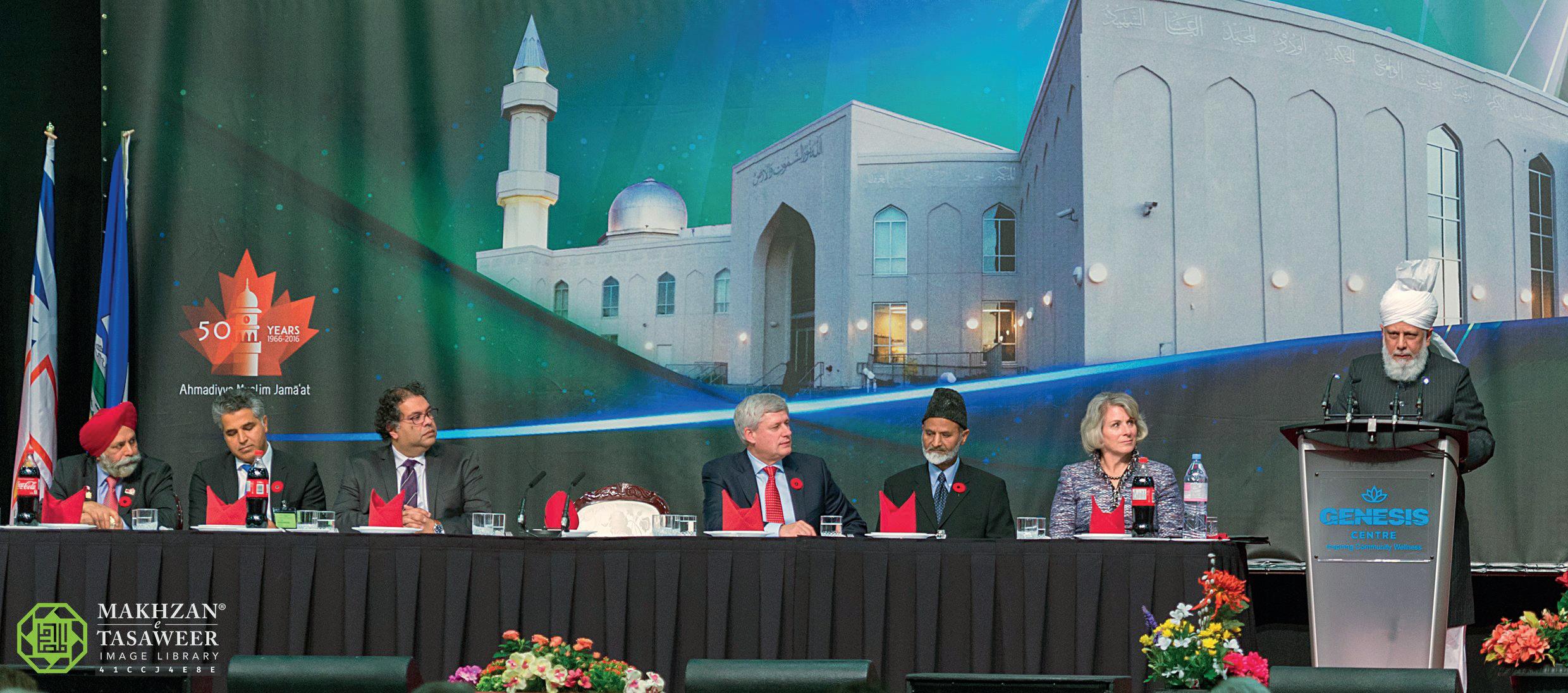
Following the conclusion of the event, Huzooraa was also welcomed by a delegation from the First Nations community. The indigenous elders gave Huzooraa a traditional welcome according to their customs and thereafter had a private audience with him.
12 November 2010: During his Friday Sermon on this day, Hazrat
Khalifatul Masih Vaa mentioned Sheikh Mahmud Ahmad Sahib of Mardan, Pakistan, who was martyred on 8 November. His 28-year-old son was also injured.
Huzooraa also mentioned Chaudhry Muhammad Siddiq Sahib, in charge of the Khilafat Library, who had passed away recently. He was born in 1915, and passed Maulvi Fazil
13 November 2015: During his Friday Sermon on this day, Hazrat Khalifatul Masih Vaa stated that Jalsa Salana Mauritius was being held, and that Jamaat-e-Ahmadiyya Mauritius was celebrating their centenary as well.
Huzooraa said:
“May Allah the Almighty bless their Jalsa Salana, and may the first hundred years prove to be the prelude to future progress.”

14 November 2014: During his Friday Sermon on this day, Hazrat Khalifatul Masih Vaa mentioned Mahmud Abdullah Shabuti Sahib of Yemen, who had passed away on 9 November. He was born on 24 May 1934. His father, Abdullah Muhammad Usman Al-Shabuti Sahib, was the first Ahmadi in Yemen. Mahmud Shabuti Sahib studied at the Jamia Ahmadiyya Rabwah and was the first foreign Ahmadi to pass the Maulvi Fazil. He got the Shahid Degree, and went back to Yemen as a missionary in 1960.
14
Khalifatul Masih Vaa condemned the terrorist attacks in Paris, France.
During a series of coordinated terrorist attacks in Paris, and the city’s northern suburb, Saint-Denis, 137 civilians had died and at least 416 were injured.
Huzooraa said:
“On behalf of the Ahmadiyya Muslim Community worldwide, I express my heartfelt sympathies and condolences to the French nation,
its people and its government following the heinous terrorist attacks that have taken place in Paris. This brutal and inhumane attack can only be condemned in the strongest possible terms.”
(“Head of Ahmadiyya Muslim Community condemns Paris attacks and prays for victims”, www. pressahmadiyya.com)















15 November 2013: During his Friday Sermon on this day, Hazrat Khalifatul Masih Vaa mentioned Bashir Ahmad Kiani Sahib of Orangi Town, Karachi, Pakistan, who was martyred on 1 November.
Huzooraa also mentioned Mian Abdus Sami Umar Sahib, who was the paternal grandson of Hazrat Khalifatul Masih Ira, and the maternal grandson of Hazrat Mufti Muhammad Sadiqra. He had the opportunity to serve Majlis Ansarullah UK as Qaid Talim and
Qaid Tarbiyat16 November 2012: During his Friday Sermon on this day, Hazrat Khalifatul Masih Vaa mentioned Hafiz Ahmad Jibrail Saeed Sahib, a missionary in Ghana. Huzooraa said that he was a loyal and sincere member of the Jamaat, and always remained a sultan-e-naseer of Khulafa of the time, and served Jamaat-e-Ahmadiyyat Ghana immensely.

After this, Huzooraa mentioned Manzur Ahmad Sahib of Quetta, who was martyred on 11 November.
17 November 2015: Hazrat
Khalifatul Masih Vaa visited the Meiji Jingu Memorial in Tokyo, Japan.
The Vice-Priest of the Meiji Shrine, Mr Shigehiro Miyazaki, officially welcomed Huzooraa and described his presence as a “great honour”. Later, Dr Mike Sata PhD, a close friend of the Jamaat, hosted a special dinner in Huzoor’s honour at the Meiji Kinenkan (also known as Constitution Memorial Hall).


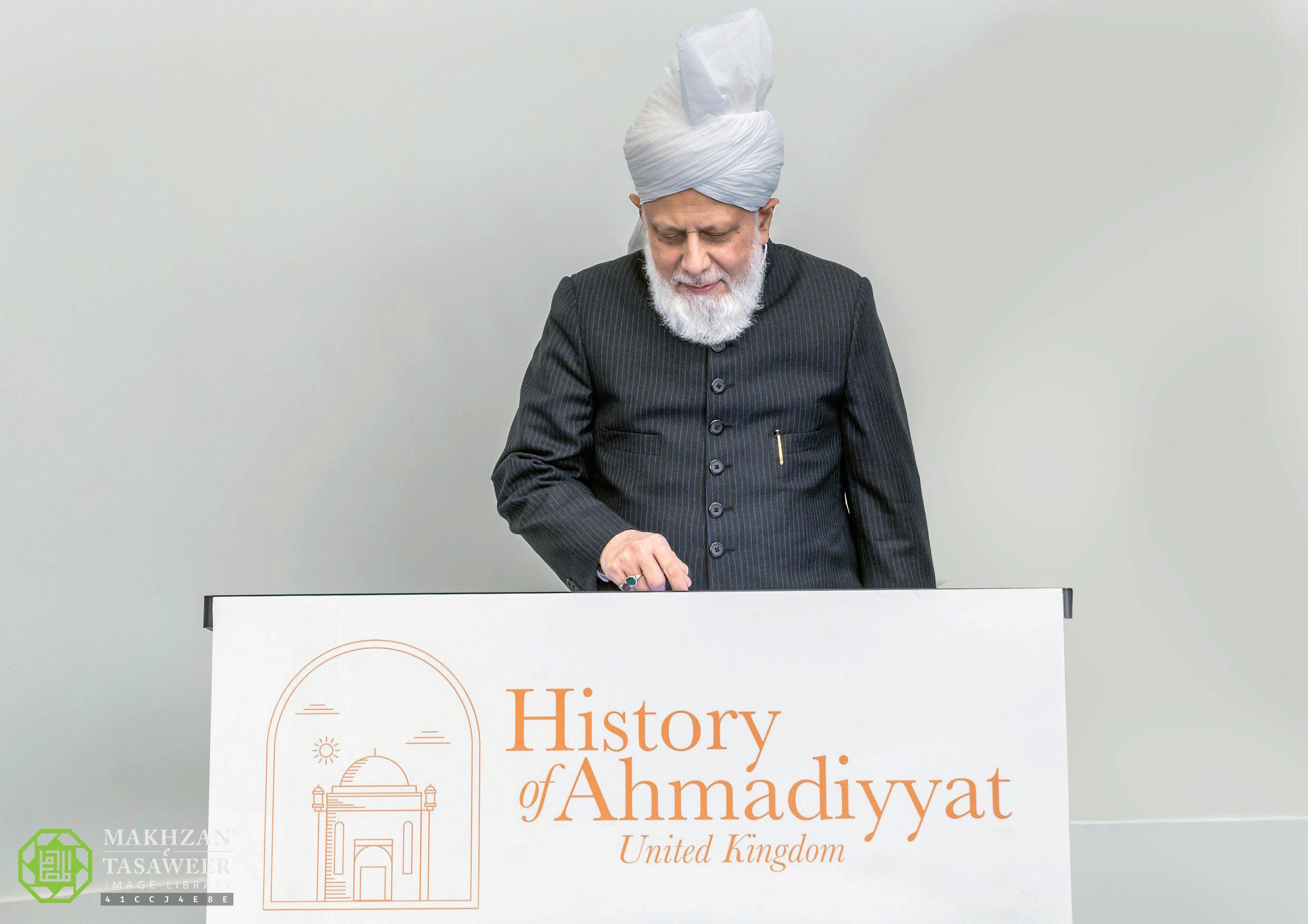 Raheel Ahmad History Department, UK
Raheel Ahmad History Department, UK
The compilation of the history of the Ahmadiyya Muslim Community in the UK initially began under the directive of Hazrat Khalifatul Masih IVrh, in preparation for the commemoration of the Ahmadiyya Centenary Jubilee to be held in 1989. A letter was sent to various countries in February 1986 from Wakil-ut-Tabshir (Director of Foreign Missions), instructing them to form a history committee to collate their historical records. A draft of a brief history of the UK Community was compiled and sent to Wakalat-e-Tabshir Rabwah (Ahmadiyya Muslim Foreign Mission Office Rabwah) for their records.
This work has continued in various capacities for the last three to four years. However, it accelerated with new vigour when it was decided that detailed research on the Promised Messiah’s efforts in conveying the message of Islam to the Western world was a paramount need in understanding the purpose of the establishment of the first external mission outside India.
The first volume on the history of the Ahmadiyya Muslim Community UK focuses on the propagation of Islam to the West during the time of the Promised Messiah, Hazrat Mirza Ghulam Ahmadas Among the topics covered in the first volume are the Promised Messiah’s efforts in reaching Western lands through letters and tracts, his debates, and interactions with the Christian clergy in India and his challenge to Dowie and Pigott. References made to the Promised Messiahas in the UK press and the visits made by many Westerners to Qadian are also discussed.
In accordance with the need of the time, it was decided the research would be published in form of articles on a website. It is hoped this will excite the curiosity of the youth to learn about the efforts made by the Holy Founderas of Jamaat-e-Ahmadiyya and the role they need to play in the West for the propagation of Islam.
The concept of the website was presented to beloved Huzooraa in a meeting by Rafiq Hayat Sahib, Amir UK and it was requested that Huzooraa officially launch the website. Hazrat Khalifatul Masihaa graciously accepted this request and arrangements were made for the launch following Friday prayers on 4 November 2022.
At the conclusion of his Friday Sermon on 4 November 2022, Hazrat Khalifatul Masihaa announced the official launch of the new website.
He stated:
“The UK Jamaat has prepared a new website, which is about the history of the Ahmadiyya Jamaat in the United Kingdom. Work on researching and collating the history was being done for many years and now a website has been prepared
which includes research articles in relation to the efforts of the Promised Messiahas in propagating the message of Islam to the West. The history of the Ahmadiyya Jamaat in the UK is generally considered to have started in 1913, when Chaudhry Fateh Muhammad Sayalra Sahib came here. However, the message of the Promised Messiahas had already reached the UK and other European countries from the moment he announced he was the Mujaddid.
“The Promised Messiahas published 8,000 copies of an announcement in English in order to inform people of his claim. These were distributed amongst the well-known and highly respected priests in India and England.
“They were also sent to various societies and religious leaders and this message was sent to as many places as it was possible to send in those days. For example, a politician in the UK, Charles Bradlaugh, who was an atheist, received the message of the Promised Messiahas in 1885.
“This has been mentioned in the Cork Constitution newspaper of 8 June 1885. Similarly, one of the founding members of The Theosophist Society, Henry Steel Olcott, received this message in 1886, which he mentioned in the September issue of his journal, The Theosophist in 1886.
“A timeline of the blessed era of the Promised Messiahas has also been published on the website, which includes various facts about the propagation of Islam in the West. Also, another timeline has been prepared under the title of pioneer missionaries, which includes the early missionaries of the community, among whom were also companions of the Promised Messiahas and it
includes their introduction and information about their missionary efforts in the UK. There is also detailed research, along with references, on the prophecy of the Promised Messiahas regarding Pigott. There are some further research articles based on the history (of the UK Jamaat) through which the youth will be able to clearly learn about the true
objective of why they and their forefathers had come to the UK. The address of this website is history.ahmadiyya.uk. Although the website has already started, they want to formally inaugurate it today.
“May Allah the Almighty enable this to be a source of benefit for our members and also the non-Ahmadis.”
100 Years Ago...
Al Fazl, 9 November 1922
The report of the gathering held at the Ahmadiyya Mosque in London on the occasion of Eid-ul-Adha and the activities carried out by holding a jalsa in addition to the Eid prayer was published on 18 August 1922 as an appendix in a foreign newspaper, “Hind”. For the information of the readers, it is given below:
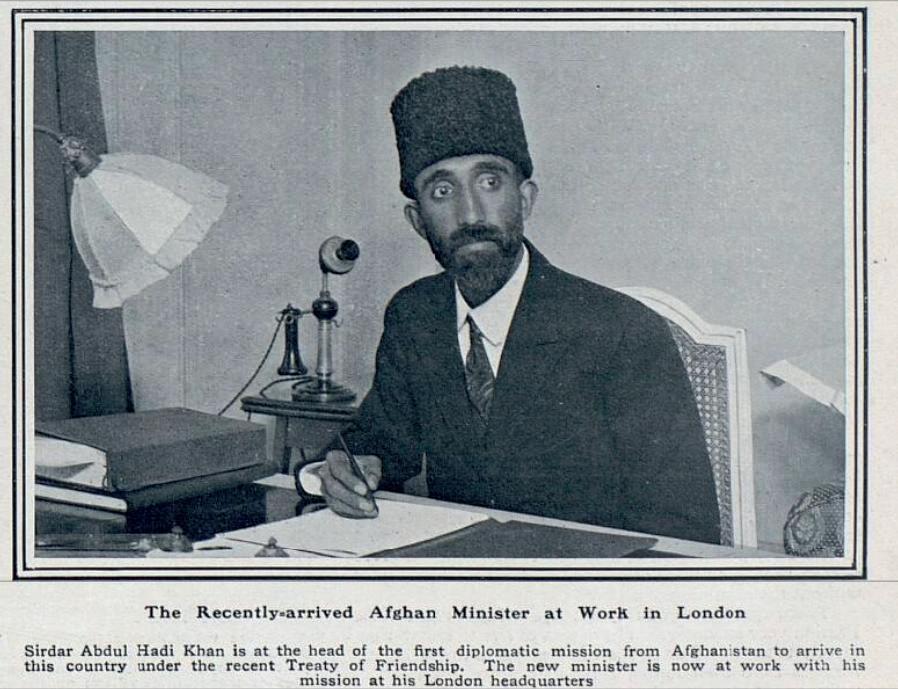
A large gathering of Muslims from all parts of the world, i.e. India, Afghanistan, Iran, Russia, Arabia, Palestine, South Africa, Riff [Morocco] etc., was held in Putney to perform the Eid prayer. After the Eid prayer, all the attendees were given refreshments. In the latter part of the day, a meeting was organised under the chairmanship of Professor HM Leon, in which, the imam of the Ahmadiyya London Mosque (Maulvi Mubarak Ali Sahib BA) first presented the annual report of the mission. After that, Mr Chaudhry Maula Bakhsh Janjua Sahib (Oxon), barrister-at-law, IDSM, gave a very interesting and scholarly speech on ‘Islam and Socialism’. He explained a difficult subject in a very eloquent manner that greatly impressed the audience. He tried to prove the compatibility of Islam and various aspects of socialism. This is one of the most difficult questions faced in the present time and it was explained in the light of (Islam), one of the world’s major global religions.
His Excellency, the Afghan Minister on Ahmadiyyat
Professor Leon [Abdullah Quilliam], Mr WH Owen and other speakers highly praised the works of the missionaries, (Imam Maulvi Mubarak Ali BT and S Azizuddin).
His Excellency, the Afghan Minister, Sardar Abdul Hadi made some strong and impactful remarks in his speech. He said, “Whether you accept the claims of Ahmad[as] of Qadian or not, you cannot ignore the great services that his followers are doing for Islam in the remote corners of the world, carrying the torch of religion. I am a great admirer of the works of the Ahmadi missionaries and I am very happy that a gathering of Muslims from all walks of life has been arranged here.” He concluded his speech by saying that “Although religion deserves full attention in this age, at the same time, a Muslim cannot ignore the political circumstances that are being faced by the Islamic empires.”
Annual report by the imam of the Ahmadiyya Mosque
Mr Mubarak Ali delivered the following speech:
Aims of the Ahmadiyya Western Mission
“Mr President, Your Excellency, ladies and
gentlemen!
“The objectives of our mission are to remove the prejudice that is spread against Islam and to convey the message of Islam to the people of the West. It is an indisputable fact that the grip of Christianity has loosened on a large part of the population. Instead, materialism reigns supreme in the West. Consequently, the Western people have been overshadowed by evil and destruction and through it, disorder and corruption have spread in society. These circumstances are heralding a disastrous revolution. The development of science and rationality is demanding a religion in this age that supports and affirms the existence of God on the one hand, and on the other, it can completely adapt to the scientific developments of the age. Islam, which is the most recent of the major historical religions of the world, presents an unambiguous yet grand concept of the attributes of Allah. Being a practical example of human brotherhood, and showing recognition and reverence for all the founders of the true religions and their fundamental principles, this is the only religion that is appropriate for the times. Therefore, it is the duty of a Muslim to invite to Islam all those people with whom they meet and develop a relationship.
“The second purpose of establishing this mission in this country is to take care of the young students who have come to this country for the purpose of education and to arrange their accommodation and admission to universities. They should also be adequately supported through various other sources.
“This mission was started in 1914 by our worthy brother Chaudhry Fateh Muhammad Sahib Sayal MA under the instructions and desire of the current Imam of the Ahmadiyya Jamaat, Hazrat Mirza Bashiruddin Mahmud Ahmad, Khalifatul Masih II[ra]. After that, the formation of the small Ahmadiyya community in this country demanded that there be a mosque of the mission and a residence for the missionaries. Therefore, the present house and the adjoining vast land were bought in 1920 for the purpose of building a mosque. The former mission office, which was located on Star Street was moved here in January 1921. The ‘Oriental House’ was launched last year to finance the London Mission, which supplies Indian-made goods for trade in England and other European countries.
“The gentlemen who have consistently
graced our lecture programme are the following honourable friends:
1. Professor HM Leon MA, LLD
2. Mr Khalid Sheldrake
3. Mr LB Augusto (West Africa)
4. Mr AJ Tongue
“Our mission is sincerely grateful for their continued keen interest.”
“Along with numerous publications of announcements and small magazines, other articles related to the Jamaat were also published. Hence, the monthly magazine The Review of Religions, the quarterly magazine The Moslem Sunrise, the English translation of the Holy Quran, and the books [The Philosophy of the] Teachings
“In this year, my friend Sheikh Azizuddin Sahib, notwithstanding the engagements of his respective business, lectured before a considerable number of attendees at several places, i.e. Dublin, Birmingham, Glasgow, Leeds, Liverpool, Nottingham, Knighton, Sheffield, Derby, etc., and in many other cities as well. These lectures do not include the speeches and debates in which he has participated with me twice a week at Hyde Park, Ahmadiyya London Mosque in Putney, Southsea, Portsmouth, Princetown and other important centres.
“The lack of knowledge of the people of the West and the general prejudice against Islam in their hearts is not at all discouraging to us. Rather, we will double our efforts and our intensities in order to cope with the task that lies before us. We believe that this unprecedented world of miseries and misfortunes, through which the present human race is passing, is the harbinger of the dawning of a new age, and its spiritual foundation has been laid by Islam and the spiritual teacher of this age has shed light on it.
Our faith is based on these things:
1. The world is lacking in spirituality.
2. It is the eternal law of God that whenever there is a scarcity of spirituality of this kind, it is removed by the breeze of
of Islam, etc., were delivered to the places [and people] where it was thought that they would be studied with due consideration. It will also be of interest to you that our missionary work is being done largely through correspondence. This year, more or less 2353 letters were sent by our office to different people, which contained some very interesting religious discussions and answers. For example, “What is the Need for Religion?” and many other similar articles, etc.
“Very soon, another missionary is coming [to London]. We hope that after his arrival, I will be able to retire from local work for some time and devote more of my time to preaching the cause of the mission in the environs of the country and in the important centres of the continent.
spirituality that blows in the world after the arrival of the Messenger of Allah.
“Now and then, God Almighty has sent His messengers. He has been sending His revelations upon them to fulfill the spiritual need that the world is in dire need of today.
“At present, there is a prophet before us if only we open our eyes to see him. Look at the divine light of Ahmadas of Qadian. Thus far, hundreds of his prophecies have already been fulfilled, and we have no doubt that his prophecies about the glorious future of Islam will surely be fulfilled as well.”
[The purpose of the following is not to highlight any supposed ‘virtues’ of the 19thcentury movement, the defects of which
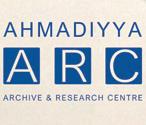

“And the conclusion of their prayer shall be, ‘All praise be to Allah, the Lord of the worlds.’ (Surah Yunus, Ch.10: V.11)
“Therefore, though the current circumstances are very bleak, my heart is filled with hope and I firmly believe that if not today, in the future, peace will surely be established in the country. If not now, then at some other point in time, the people will incline towards peace and harmony, and leave aside the disorder, violence, enmity, and division. [...]
“Islam teaches: ناميالا
“Meaning that ‘Love for one’s country is part of faith.’ [Mauzu‘at-e-Kabir, by Mulla Ali Qari, p. 35, published from Delhi in 1315 Hijri]
to make themselves socially independent. [...] The Muslims have given all of the sources of their national life to others. [...] If the Muslims wish to prosper, they would need to stand on their own feet and make themselves independent from others. [...]
On 14 November 1923, Hazrat Mirza Bashiruddin Mahmud Ahmad, al-Muslehe-Maudra delivered a public speech at the Bradlaugh Hall in Lahore, where a huge number of Hindus and Muslims were in attendance. The session was chaired by Sir Sheikh Abdul Qadir Sahib, barristerat-law, whose name for the presidency was proposed by Hazrat Sir Chaudhry Muhammad Zafrulla Khan Sahibra and seconded by Babu Abdul Hameed Sahib.

In his introductory remarks, the president of the session said:
“Respected audience, first of all, I wish to thank you all for allowing me to preside over such a great gathering, which a very distinguished religious leader is going to address. You might know that respected Mirza Bashiruddin Mahmud Ahmad Sahib, whose presence here is an immense fortune for the people of Lahore, is going to speak on a crucial matter. He is the religious leader of a large Muslim community and has devoted his whole life to religious goals. [...]” (Al Fazl, 20 November 1923, p. 7)
At the beginning of his lecture, Hazrat Musleh-e-Maudra said the turmoils and disorders prevalent in British India were enough to urge everyone who claimed to love their homeland to contemplate finding solutions to those problems.
Huzoorra continued:
“I belong to that religion which has instilled a passion of hope by commencing [its teachings] with:
“‘All praise belongs to Allah, Lord of all the worlds.’ (Surah al-Fatihah, Ch.1: V.2) “And religiously, I believe in that [Holy] Book, which has granted us everlasting hope by teaching the Muslims that:
“Currently, the circumstances of our country are such that [political] parties are not ready to show compassion towards each other. In the past, there was a sense of mutual love within the country; Muslims, Hindus and Sikhs had the spirit of brotherhood among them. But today, these communities are expressing their opposition and enmity towards each other, which has halted the country’s progress.
“Some people blame us [Ahmadis] for being the cause of the disorder, and that we hinder the way of unity and agreement. However, the reality is that no one is more against this disorder than we are. [...] Anything that creates disorder, we consider to be wrong and we are ever ready to offer all kinds of sacrifices and to bear all sorts of afflictions for anything that we deem beneficial for our country and homeland. [...]
“Currently, the country’s peace is completely shattered; brothers are clashing with brothers, and those who were supposed to be exerting efforts with unity for the progress of the country and homeland, are blood-thirsty towards each other. [...]
“In the presence of such a beautiful teaching, there is no need to invent any other policy because when the Foundersa of Islam has taught that ‘Love for one’s country is part of faith’, then no Muslim can be a [true] Muslim until they inculcate the love of the country in their heart.” (Paigham-eSulh: Maujuda Mushkilat Ka Hal, Anwar-ulUlum, Vol. 7, pp. 295-304)
Huzoorra went on to narrate the reasons behind the disputes and disagreements between different communities of British India.
After this, Huzoorra outlined a pathway for the Muslims of British India, which was necessary for their strength and prosperity. Huzoorra said:
“The first thing that can help in conciliation is that the Muslims should strengthen themselves [as a community]. [...] In comparison to the Hindus, the Muslims are in more need of strengthening themselves. [...] The Holy Quran commands the Muslims:
“In addition, the Muslims need to pay attention to trade and industry and they should also join the fields of medicine and law in greater numbers. The Muslims are far behind in banking; thus, they should make progress in this regard. Although I am against the dealing of interest because Islam does not permit it, I believe that a bank can still function without interest, provided the nation is prepared. Moreover, Muslims should pay attention towards trading since currently the export and import of India are wholly in the hands of Hindus. [...]
“Thirdly, the Muslims need to instil unity and mutual harmony by removing their internal political and religious disagreements. [...]
“Fourthly, religious spirit should be inculcated amongst the Muslims. I am seeing that Muslims are moving away from their religion and expressing their love for religion only on the political spectrum. The Muslims must not only instil religious passion within themselves but also in their children as well.
“‘O ye who believe! take your precautions; then either go forth in separate parties or go forth all together.’ (Surah anNisa, Ch.4: V.72) [...]
“Therefore, the Muslims must strengthen themselves and for this, they need to be organised. [...] Secondly, Muslims need
“Fifthly, the preaching of Islam needs more attention. [...] Therefore, I will advise the Muslims that, if they wish to progress, they are required to spread their religion. Moreover, they should not get angry at the Hindus that they are propagating their religion; rather [the Muslims] need to propagate their own religion and convert
people to Islam. The Holy Quran has declared tabligh of the religion as a Muslim’s duty. Therefore, it is stated: نوہنتو فورعملاب نورمات
“‘You are the best people raised for the good of mankind; you enjoin what is good and forbid evil.’ (Surah al-e-Imran, Ch.3: V.111)
“The superiority and excellence of the Muslims [can be proved] by bringing the followers of other religions towards Islam.
“Sixthly, the poor people should be cared for. This is a social necessity because until there is affection and a certain bond amongst the people of a nation, it cannot progress. However, I am afraid to say that there are certain wealthy people among Muslims who care for their own lives but not for the poor. There should be such organisations and societies that teach professions to poor people and then create work opportunities for them.
“Seventhly, special arrangements should be made for those people in the nation who cannot work, for instance, the disabled. Similarly, the orphaned children should be provided with education and tarbiyat [moral training].” (Paigham-e-Sulh: Maujuda Mushkilat Ka Hal, Anwar-ul-Ulum, Vol. 7, pp. 313-317)
Huzoorra then invited all groups and communities in India to work towards es tablishing peace and harmony in the coun try:
“Peace cannot be established until all of the parties reconcile with each other. [...] I include the government in these parties as well. Now, the British government is part and parcel of our country and it would be wrong to hope for conciliation to be main tained by leaving aside [the government]. [...] I am not of those who say that whatever the government does is right, but rather I say that sometimes the government makes mistakes as well.
“On such occasions, I had drawn the government’s attention using firm language, which was necessary (firm language does not mean abusing, since Islam forbids it, rather it means to explain to the government their mistake in clear and frank terms). [...] And I have noticed that on most occasions the government has accepted those suggestions. [...]
“Peace cannot be established in the country until there is religious conciliation. The followers of a certain religion cannot enter into a settlement which harms their religion. Religious conciliation does not mean that all Muslims become Hindus or all Hindus become Muslims, rather, it means that the followers of all religions respect the leaders of each other’s religion. [...]
“If one asks how the conciliation could be established, then I will say that Islam has taught its pathway, and I am among the followers of this pathway taught by Islam. I respect the founder and leader of every religion. If a Hindu asks, ‘Do you believe in Ramchandar?’ I will respond that I believe him to be a prophet because the Holy Quran states:
“‘And there is no people to whom a Warner has not been sent.’ (Surah Fatir, Ch. 35: V. 25)
“Therefore, [supposedly] if I say that [God forbid] Ramchandar Ji and Krishan Ji
were false [claimants], it will falsify the Holy Quran. Thus, the Holy Quran has given its decree about this dispute that every Muslim stands for respecting the leaders of other religions, not disrespecting them. This is the point of view of the Muslims. Now, I ask the Hindus (it does not mean to say that they are bound to respond, but rather contemplate and think in their hearts) whether they are ready for this and if yes, then such a strong conciliation can be established that will be everlasting. [...]
“However, if they are not ready for this, then at least the Muslims and Hindus should narrate the distinctive features of their respective religions. [...] Therefore, if the Hindus do not accept the Holy Prophetsa as a truthful prophet of God, they should at least agree to narrate the distinctive features of their religion and avoid raising allegations against Islam. If they agree to this, it will be enough to create unity.
“The founder of our Community, Hazrat Mirza [Ghulam Ahmad] Sahibas had presented this solution a while ago, but sadly, the country did not pay attention to it. The result was that unity could not be established, and it certainly cannot be established until [the above-mentioned solution] is acted upon. [...]
“The followers of a certain religion should not be deprived from [acting upon] their religious fundamentals. [...] Hence, we Muslims are ready to not deprive the Hindus of anything that is part of their faith, and similarly, the Hindus are required to not deprive us of anything that is lawful for us. [...] Thus, it is necessary to accept the rights of every community. [...]
“In the end, while reminding you of the responsibilities which are incumbent upon you concerning the country’s love, morals, soul and humanity, I appeal to you to pon der on these proposals. May Allah the Al mighty enable us all to follow those pathways that could es tablish peace and harmony.”
( Paigham-eSulh: Maujuda Mushkilat Ka Hal, Anwar-ulUlum, Vol. 7, pp. 318-325)
After Huzoor’s lecture, the president of the session delivered his concluding remarks and said:
“I express my gratitude to the respected Mirza Sahib for delivering such a comprehensive and insightful speech. He stated that ‘I spend my whole time in religious study’, however, he has shed light on the political situation so extensively that our hearts and tongues are compelled to appreciate it. You all would have noticed that respected Mirza Sahib has pointed out all aspects of unity and harmony in such a nice and profound manner that cannot be expected from political leaders. In fact, they [political leaders] are unable to do so, since they have an affiliation with a certain party, however, respected Mirza Sahib has no affiliation with any party, and thus, he has stated all aspects in great detail without any hesitation.” (Al Fazl, 20 November 1923, p. 9)
have been underlined by the Ahmadiyya caliphs on various occasions. Rather, it is merely a historical account of the personal views of Chaudhry Maula Bakhsh Janjua about how some aspects of socialism may become compatible when infused with the spirit of Islam. — Editor Al Hakam]
State of the world Chaudhry Maula Bakhsh Sahib Janjua, barrister-at-law, said:
“Today, the world is shifting into a new dimension. Not even the wisest of people can predict what will be the outcome of the current situation.
“Since the Great War of 1914, nations, empires and superpowers have crumbled like the house of cards. In place of them, new kingdoms sprang up like mushrooms growing in the darkness of the night. The world is flailing like a blind person and is struggling to create a new system. Many different kinds of movements are being established and they are striking every rational person. We observe that socialism has taken the path of extremism in the form of Bolshevism. It is the duty of all religions to help their followers solve these social disorders, as we are witnessing the effect of socialism in our surroundings. Thus, my aim today is to express what is the Islamic point of view regarding these very important and necessary questions.
Was there socialism before the Holy Prophetsa?
First [Chaudhry Maula Bakhsh Sahib Janjua] defined socialism and then explained its relationship with Islam in detail. He then said:
“To assess the impact of Islam or socialism we must first see whether such movements were present before the arrival of the Holy Prophetsa or not. We know that a few states were definitely trying to implement the democratic form of government, but they did not know the true socialism. In Arabia, the most barbarous system of government prevailed. Taking personal revenge was the common law of that time. Drinking, adultery and marrying countless women were common practices there. The slaves were considered property. Everywhere, there were unfathomable sins. This was the state that cried out in unison for a saviour. Thus, a saviour was sent by the Most Merciful God and he was none other than the Prophet Muhammadsa who appeared with this message of Allah the Almighty that, ‘Humanity has complete superiority over nationality.’”
He [Chaudhry Maula Bakhsh Sahib Janjua] explained in detail as to what the mission of the Holy Prophetsa was. He expressed that it was essential for a living religion to be able to answer the most important and necessary questions of the time. Then he presented the general teachings of Islam and also mentioned in its light as to what effects were produced in the Islamic professors with respect to the judicial, political, strategic and economic state.
While discussing the religious civilization, he said, “The greatest socialist of the world (Muhammadsa) ultimately gave hope to all mankind of salvation.”
Finally, while discussing the Prophet’s successors and electoral method, he clarified the relationship between the rulers and the subjects. He said, “The noise we are hearing today about the difference in status between the poor and the rich, there was no sign of it in Islam.”
He explained the law of inheritance. He shed light on the policy of the Holy Prophetsa in detail and said, “The prohibition of usury encourages the spirit of hard work and commerce. It puts an end to those Shylocks who are destroying the very foundations of socialism of our time.”
After discussing the progress of Islam, he referred to the failures of the present socialist movements and said, “This is the age of knowledge and science. Science has invented countless devices. Science has given us aeroplanes, and submarines and opened many deadly avenues. This is the age of materialism.”

He then said, “Genuine socialism cannot be expected from such nations that shed the blood of mankind like water.” He said, “The community of Islam is also not free from the stain of materialism to some extent. However, this is not the fault of Islam. The later generations are responsible for this. On the other hand, Islam has many signs of true socialism as preached by the Holy Prophetsa.”
While explaining these signs, he said, “socialism can only be achieved if the individual character is uplifted and purified. This character can only be developed by true religion.”
“Europe is apparently not capable of providing this efficient religious power and it was never present in them, but the question is where this power can be found. Islam is the only religion that can fulfill this need in its pure and original form. The Holy Prophetsa was sent to all mankind, then why does Europe not extend its hand to accept the Islamic beliefs.
“Before concluding my speech, I would like to point out to my friends that the Holy Prophetsa had openly predicted that a Messiah would appear at an appointed time to revive and strengthen Islam. Now there is no doubt that the Promised Prophet has been sent with the name, power and spirit of the Messiah of Nazareth. His name is Ahmadas of Qadian. He was born in 1835. He was a constant phenomenon and a manifestation of God’s power and glory from the time of his birth until his death. It is through him that I have mustered the strength to show that only Islam is the cure for Europe’s social disorders, as it is standing on the right foundations.”
(Translated by Al Hakam from the original Urdu, published in the 9 November 1922 issue of Al Fazl)




A series looking at pioneer missionaries and devotees of the Ahmadiyya Muslim Jamaat who gave precedence to faith over the world.
The sacrifice of the early missionaries of the Jamaat is, simply put, immeasurable. Their efforts, accompanied by the prayers of the Khalifa of the time, witnessed great feats and heights. They employed every opportunity that presented itself and certainly went the extra mile.
Not only did they convey the message of Islam to their surrounding villages and local areas, but they also delivered the message of Islam, with great confidence, to politicians, presidents, rulers, kings and governors of countries. They presented gifts of the Holy Quran and literature on Islam Ahmadiyyat. They gave speeches and enlightened audiences with the exceptional message of the teachings of Islam.



Maulana Muhammad Siddiq Amritsari Sahib served as a life devotee [waqife-zindagi] and missionary in various countries. In his memoir, Ruh Parwer Yadain, he writes:

in charge of the Ahmadiyya Mission in Liberia, and personally presented him with a copy of the English translation of the Holy Quran, Teachings of Islam, Ahmadiyya, Life of Muhammad […] I also gave him a typed welcome address, some parts of which he read in front of me and expressed his thanks [for this gesture].” (Ruh Parwer Yadain, p. 534)
Maulana Muhammad Siddiq Sahib writes Dag Hammarskjöld’s secretary sent a message stating that the Secretary-General of the United Nations valued the principles presented by the Holy Quran and expressed his best wishes.
In the same book, Maulana Muhammad Siddiq Sahib, amidst writing about an incident of preaching Islam to the first Prime Minister of the Republic of Congo, stated:
Yadain, p. 553)
Maulana Muhammad Siddiq Sahib introduced the basic beliefs and teachings of Islam, the history of Ahmadiyyat and the Promised Messiahas and further invited him to accept Islam. He requested he study the Holy Quran carefully. In response, Patrick Lumumba thanked Maulana Muhammad Siddiq Sahib and the delegation for their kind gesture. He said that he was a born Christian and had never considered the beliefs or teachings of the religion of Islam, nor had he ever seen the Holy Quran. He was grateful to the Ahmadiyya delegation for explaining the reality of Islam and for the gift of the Holy Quran.
he set out on a journey with his wife and relatives and passed through the Assyrian tribes on the way from Damascus to Baghdad.
On the 10th day of the journey, he reached Baghdad and distributed the Jamaat’s magazine, Al-Haqa’iq ‘an alAhmadiyya, while conveying the message of Ahmadiyyat. He narrates:
“In December 1959, Secretary-General of the United Nations, Dag Hammarskjöld, first visited Monrovia, the capital of Liberia, while making an official visit to African countries. Remaining there for three days, he studied the political, cultural, and general country conditions of Liberia. Taking advantage of this opportunity, I met with him on 23 December 1959 as the missionary
“On the invitation of the President of Liberia, Mr William Tubman on 6 August 1960 the first Prime Minister of the new Republic of Congo, Honourable Patrick Lumumba, visited Monrovia, the capital of Liberia, for four days. A delegation of Ahmadiyya Jamaat Liberia, under this humble one’s leadership, met with him, congratulated him on the independence of Congo and presented to him the English translation of the Holy Quran, Teachings of Islam, and Life of Muhammad.” (Ruh Parwer
In 1924, when Hazrat Musleh-e-Maudra returned from his tour of Europe, he appointed two missionaries to Syria: Hazrat Syed Zainul Abideen Waliullah Shah and Hazrat Maulana Jalaluddin Shamsra

They left for Damascus, Syria on 27 June 1925 and arrived on 17 July 1925. From there, Hazrat Syed Waliullah Shah Zainul Abidin went to Baghdad at the beginning of 1926, where the Ahmadiyya Jamaat was banned from preaching.
In the account of his trip, he writes that
“My old and dear friend in Baghdad, the late Rustam Haider, was head of the academic committee at Salahuddin Ayubiyah College and a professor of general history. He was educated at the Sorbonne University (France) and is a capable Arabic writer. Allah placed a lot of love and respect for me in his heart. He was very happy about my arrival in Baghdad. He organised various sittings to which respected friends of the city were invited. He was the minister of the personnel department. [Through him] I was introduced to ministers, officials and scholars.
“Even King Faisal [of Iraq] invited me to a feast to which only a few people were invited. During the meal, Rustam Haider mentioned the Ahmadiyya Jamaat in praise and the late King Faisal asked questions about Ahmadiyyat […]. During a detailed discussion about the Dajjal, he asked me the meaning of the verse وهو � راصبالا هکردت ال راصبالا كردی [Eyes cannot reach Him, but He
In fact, the million-dollar opportunity lies in going to Jumuah, not neglecting it.

Our Prophetsa tells us that the best day upon which the sun has risen is Friday and that attending Jumuah serves as expiation and forgiveness for our sins. (Sahih Muslim, hadith 872a)
reaches the eyes.] (Surah al-An’am, Ch. 6: V.104) Before answering, he addressed his brother, Ali, and said, ‘Brother, you are a great scholar. What do you understand by this verse?’ The young man explained what he had read in books of tafsir. Then the late king addressed me and asked what I understood from it. I gave him a detailed answer, to which he was so pleased, he instantly said that if Islam was destined to be rejuvenated, it would be through the ideas I [Hazrat Syed Zainul Abideen Waliullah Shah] expressed.
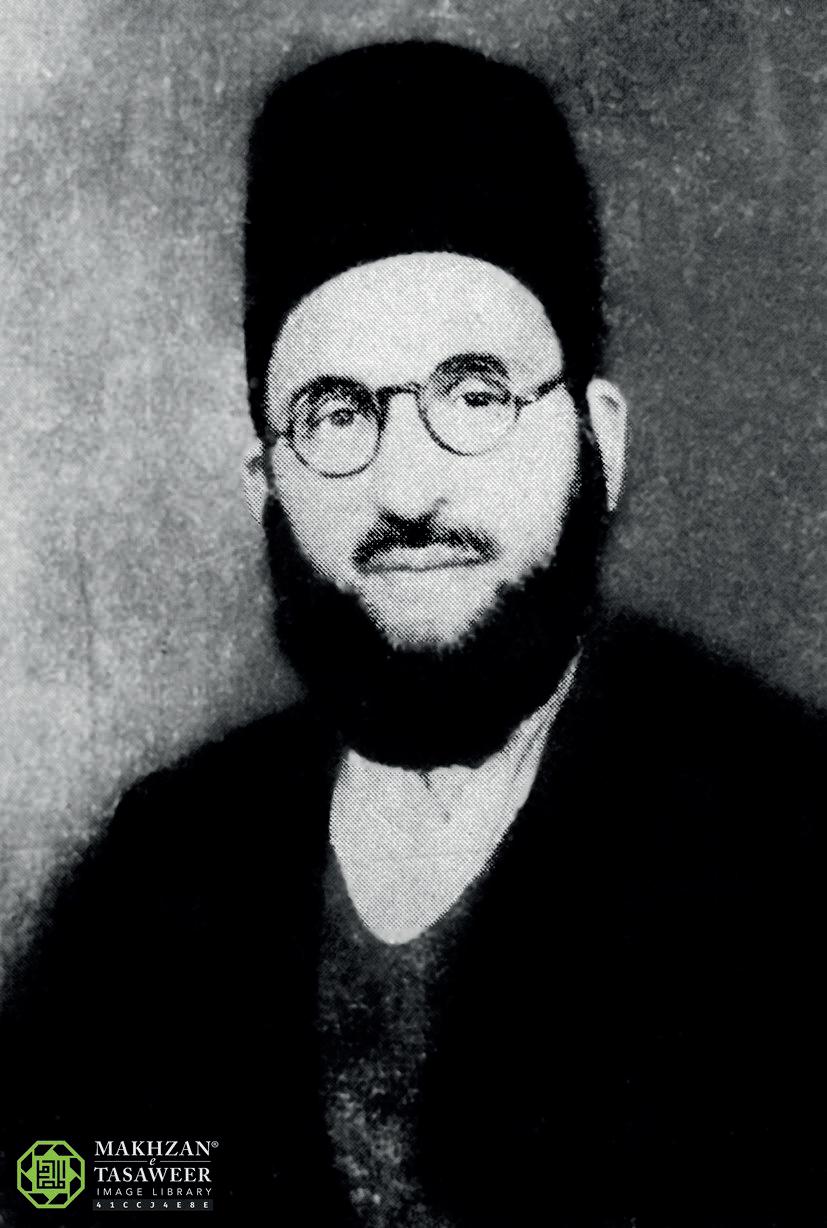
“After the meal, I immediately thanked him and said: ‘Every religion in your country has freedom of preaching, even for the fierce enemies of Islam like the Aryas, yet there is no freedom for the Jamaat, whose views the king has praised.’
“Whilst getting up from the dining table, he said, ‘You shall receive greater freedom than them.’ Later, when Rustam Haider brought me to his house, he had his secretary type a request in Arabic, which I signed. It was then presented to the king […] this request was circulated in offices for three months and eventually, after many disappointments, one evening, after we had offered our Maghrib prayer, an official messenger came and handed a envelope to Jafar Sadiq, the late amir of the Jamaat. It contained an intimation from the Ministry of Home Affairs with the king’s seal that their previous order was revoked by the king and full (religious) freedom was granted to the Ahmadiyya Jamaat. After hearing these words, members present in Maghrib prayer prostrated at once as their state of despair had reached a limit.’” (Masalih al-Arab, Volume 1, pp. 171-172)
Appreciating the diplomatic efforts of Hazrat Syed Zainul Abideen Waliullah Shah, Hazrat Khalifatul Masih IIra said:
“‘In my opinion, Shah Sahib has done a splendid job,” Huzoorra said this achievement, politically, had a far-reaching effect. Huzoorra added that prior to this incident, it was very difficult to preach there. It was also forbidden to hold meetings in homes. Huzoorra said this feat, achieved by Hazrat Syed Zainul Abideen Waliullah Shah, was no small task. With this achievement, “‘It will be understood that Ahmadis can change the opinion of the governments’”, Hazrat Musleh-e-Maudra said. (Masalih alArab, Volume 1, p. 172)
It’s Friday.
The clock has struck 1 pm and the muezzin has raised his hands in the mosque, calling you to prayer. The angels have scrolls in their palms, waiting at the door to record your name as you enter God’s sanctuary.
But you’re in the office, waiting on the deal of a lifetime. A million-dollar deal.
You’ve worked so hard to land the client and to work out the details.
But Jumuah is waiting. What do you do?
Do you close on this million-dollar deal, guaranteeing you that coveted promotion, landing you cash in the bank, and resolving all of your financial woes?
Or do you pack up your belongings, and make your way to Jumuah?
Obviously, I can’t miss out on this million-dollar opportunity, so Jumuah can wait this week, right?
Wrong.
Not even a million dollars should stand in your way to Jumuah.
Hazrat Khalifatul Masih Vaa tells us:
“Even if it is peak business hour, when neglecting your business affairs and trade can result in a loss of millions of dollars, you should not care.
“You should attend the Friday prayers, without thinking of any potential loss that can occur in doing so. This is because going to the mosque to attend the Friday prayers and listening to the Friday sermon of the Imam is hundreds of thousands of times better for you than any of your trades, businesses or other worldly affairs.” (Friday Sermon, 31 May 2019)
He even lets us in on a secret: There is a special time on Friday that can alleviate a lifetime of worries and fulfil a lifetime of dreams. If a Muslim finds this short period of time and prays to Allah, asking Him anything, then Allah will certainly meet his or her demand and accept their prayer. (Sahih al-Bukhari, hadith 935)
Even the flames of the hellfire have been smothered on Friday. (Mishkat al-Masabih, hadith 1047)
But, say you’re not convinced. This million-dollar deal is too lucrative for you to miss out on. Jumu’ah doesn’t stand a chance. What’s really on the line? In gaining the million dollars, what do you risk? What do you stand to lose?
Allah’s love.
The Holy Prophetsa himself says that if you truly believe in Allah and in the Day of Judgment, then it is absolutely mandatory for you to attend Jumuah. He goes on to say that if you neglect Jumuah because of your work, business, or any other vanity or pleasure, then Allah the Almighty will neglect you as you have neglected Him. (Kanzul Ummal, Kitab-us-Salat, hadith 21120)
So you can lose out on the million dollars, or you can lose Allah. You decide which is more valuable to you.
Even the Holy Prophet Muhammadsa expressed his displeasure with those people who did not attend Friday prayers. The Prophetsa is reported to have stated: “I have thought about commanding someone else to lead the people in prayer, while I go and burn the houses of those who stayed away from the Friday prayer.” (Mishkat alMasabih, hadith 1378)
Let’s take another perspective on this.
Did you know that you can measure your sincerity as an Ahmadi based on your attendance at Jumuah?
Don’t take my word for it, take your Khalifa’s.
Hazrat Khalifatul Masih Vaa says that “God tests us to measure our connection with the Promised Messiahaa and to see what extent we are true in our bai’at, our pledge, to him.” For this, “our attendance at Friday Prayers has been set as the benchmark to measure the sincerity of our bai‘at.” (Friday Sermon, 18 September 2009)
So when was the last time you attended Jumuah?
The answer to this question may speak volumes about your sincerity as an Ahmadi in the eyes of Allah.
The Holy Prophetsa once stated: ىنفي ال زنك ةعانقلا
Meaning, “Contentment is a never-ending treasure.” (Az-Zuhd al-Kabir by Baihaqi, p. 88 [1996]; Mirqat-ul-Mafatih, hadith 5170, Vol. 8, p. 3238 [Beirut: Darul Fikr. 2002])
Today, this principle is more binding than ever. Some time ago, someone asked Hazrat Khalifatul Masih Vaa what we ought to do about the worsening economic health of the world. Huzoor’s reply forms the bedrock of the Islamic perspective on wealth:
“Develop contentment this is what Allah the Almighty has instructed; to develop contentment within yourself. If one becomes content, unnecessary spending and unjustified wants will reduce. […]
“Those who are religious do not drown in worldly greed. You are to guide the world that ‘instead of chasing worldly greed, usurping each other’s rights, stealing, creating disorder and violence in the country against governments and holding protests, develop contentment within yourself and use your money in the most effective way’.
“If Ahmadis carry out their own tarbiyat in this way, they will be able to do the tarbiyat of the rest of the world too.
“This is a constant effort that you
will have to exert. According to your circumstances there, create a plan of action. I have given a general plan of action many times: Develop contentment, connect with your faith, and as a result, worldly desires will reduce. Otherwise, worldly desires never end, they continue to increase. It is an ailment like itching a person continues to itch, enjoys it and in the end, wounds himself. And so, ultimately, worldliness will only result in injuring oneself.
“Therefore, contentment and Allah’s remembrance attention to salat will resolve everything else. Develop a connection with Allah and all other ailments will be resolved as a result.” (Al Hakam, 9 September 2022, Issue 234, p. 3)
Islam teaches Muslims a unique perspective when it comes to financial matters. The Holy Quran states:
remembrance of Allah that can lead to inner peace. (Surah ar-Ra’d, Ch.13: V.29)

The Holy Prophetsa embodied the same teaching. He lived his life in straitened circumstances and yet he was always content. This was because he constantly remembered Allah. Hazrat Aishara narrates that he remembered Allah at every moment of his life. (Sahih Muslim, Kitab al-Haiz, hadith 373)
He advised his companions to live in this world as if they were strangers, meaning they should adopt simplicity and treat this world as temporary. (Sunan Tirmidhi, Kitab az-Zuhd, hadith 2333)
The Holy Prophetsa stated, “Are you not satisfied that they enjoy this world and we enjoy the Hereafter?” (Sahih al-Bukhari, Kitab at-Tafsir, hadith 4913)
On another occasion, the Holy Prophetsa beautifully expressed his life in these words: “What do I have to do with this world? The likeness of me and this world is that of a traveller who seeks shade under a tree, then he moves on and leaves it.” (Musnad Ahmad, Musnad Abdullah bin Mas’ud, hadith 3709)
The Holy Prophetsa always entreated his companions to have complete trust in Allah to provide them with their needs. He stated: “If you trust in Allah in the appropriate manner, you will be given sustenance like the birds. They leave their nests with empty stomachs in the morning and return in the evening fully satiated.” (Sunan Tirmidhi, Kitab al-Zuhud, hadith 2344)
Following the example of his beloved master, the Promised Messiahas also had complete trust in Allah the Almighty. While he was still a young man, his father passed away, leaving him with little. Worried about how he would survive without a flowing income, he turned to God. Allah consoled him, stating:
Meaning, “Is Allah not sufficient for His servant?” (Tadhkirah [2018], p. 31; Kitabul-Bariyyah, Ruhani Khazain, Vol. 13, pp. 194–195, footnote)
After receiving this revelation from Allah, the Promised Messiahas, describing his condition, states:
“This revelation afforded me complete comfort and satisfaction and it impressed itself upon my heart like a steel nail. I call to witness Allah, the Lord of Honour and Glory, in Whose hands is my life that He has demonstrated the truth of this revelation of glad tiding in a manner that I could not have conceived. He has provided for me as no father could have done for a child.” (Kitabul-Bariyyah, Ruhani Khazain, Vol. 13, pp. 194–195 footnote)
Speaking of this remarkable trust in Allah, the Promised Messiahas states:
“I find that the state of my heart is a strange one. When it is extremely humid and the heat becomes immensely intense, people begin to hope with a sense of certainty that rain will soon follow. Similarly, when I find my casket to be empty, I feel a firm sense of certainty in the grace of God that now it will be replenished, and this is exactly what happens.”
“And strain not thy eyes after what We have bestowed on some classes of them to enjoy [for a short time] the splendour of the present world that We may try them thereby. And the provision of thy Lord is better and more lasting.” (Surah Ta Ha, Ch.20: V.132)
Allah the Almighty states that one should not look at what others have been given, since it can derail a person from their true purpose, and foster greed and jealousy. Instead, Allah states that it is only the
The Holy Prophetsa practised this to perfection. Hazrat Umarra narrates that once he went to see the Holy Prophetsa at his home. The Holy Prophetsa was lying on a mat made of palm tree leaves with nothing between him and the mat. Underneath his head there was a leather pillow stuffed with palm fibres, and leaves from a Saut tree were piled at his feet, and above his head hung a few water-skins.
On seeing the marks of the mat imprinted on his side, Hazrat Umarra began to weep. Huzoorsa asked him why he was weeping. Hazrat Umarra replied that kings of this world were leading luxurious lives whereas the Holy Prophetsa was leading such an austere life.
Then, the Promised Messiahas swore by God Almighty and said:
“When my pouch is empty, the sort of joy and pleasure that I experience in trusting God Almighty at such a time is beyond my ability to explain. My state at such a time is extremely comforting and satisfying, in comparison to when my pouch is full.” (Malfuzat [English], Vol. 2, p. 43)
Such exemplary trust is a reflection of the Quranic verse:
for him a way out, and will provide for him from where he expects not. And he who puts his trust in Allah He is sufficient for him.” (Surah at-Talaq, Ch.65: V.3–4)
Therefore, Islam has provided a balanced method for approaching spending. Allah the Almighty states:
Hazrat Bilalra. He saw a heap of dates by him and inquired, “Bilal, what are these dates for?” Hazrat Bilalra replied, “I intend to store them for the next year.” Huzoorsa asked, “Are you not afraid that hellfire would be ignited with these dates?” Then he advised him to spend in the way of Allah and to not be scared of poverty. (Mu‘jamul Kabir by Tibrani, Vol. 1, p. 340, hadith 1020)
whose means of subsistence are straitened spend out of what Allah has given him. Allah burdens not any soul beyond that which He has given it. Allah will soon bring about ease after hardship.” (Surah At-Talaq, Ch.65: V.8)
“And keep not your hand chained to your neck [in utter stinginess] nor extend it in extravagance to the full; or you will end up roundly condemned [and] rendered ineffectual.” (Surah Bani Israel, Ch.17: V.30)
This means that one should not be so miserly as not to spend it even when there is a real and genuine need as if his hands are tied to his neck, nor should one stretch forth one’s hands so openly as to squander away his wealth purposelessly. One should strike the golden mean.
In the next verse, Allah speaks of the underlying principle:
Similarly, someone asked the Holy Prophetsa about which charity was the most superior in reward. The Holy Prophetsa replied, “The charity which you practice while you are healthy, niggardly and afraid of poverty and wish to become wealthy.” (Sahih al-Bukhari, Kitab az-Zakat, hadith 1419)
Consumer culture would have us constantly spend on ourselves, encouraging us to buy things we don’t really need. Islam opposes such materialism and encourages us to spend out of our wealth, so that we don’t think money is everything, lest it destroy us.
During the life of the Holy Prophetsa, a companion came to him and confessed to committing a sin. The Holy Prophetsa asked him if he could free a slave as a means of atonement. He said he couldn’t. Huzoorsa asked him if he could fast for two months consecutively. He replied that he couldn’t.
Just then, someone brought a basket of dates to the Holy Prophetsa. The Holy Prophetsa handed the dates over to the companion and asked him to give them to a needy person. He replied that there was no one poorer than him in Medina. Huzoorsa laughed, and asked him to feed the dates to his family. (Sahih al-Bukhari, Kitab asSaum, hadith 1936)
However, this does not mean that Islam glorifies poverty. The Holy Prophetsa always prayed to be saved from debt. He also prayed that Allah might save him from the affliction of poverty. (Sahih al-Bukhari, Kitab ad-Da’wat, hadith 6368) The Holy Prophetsa always encouraged people to earn a livelihood so that they may fulfil the rights of their family, friends, and society. (Sahih Muslim, Kitab az-Zakat, hadith 1042)
Even when preparing a will, the Holy Prophetsa stated it was better to leave one’s inheritors with a good inheritance than to give all of one’s wealth to charity. (Sahih alBukhari, Kitab ad-Da’wat, hadith 6373)
Encapsulating this entire subject, the Promised Messiahas states:
“Surely, thy Lord enlarges [His] provision for whom He pleases, and straitens [it for whom He pleases]. Verily, He knows [and] sees His servants full well.” (Surah Bani Israel, Ch.17: V.31)
God grants plenty to some and straitens the means of livelihood for others. He does so that He may see whether those upon whom He has bestowed wealth help those who are poor and needy.
In this way, this verse teaches the supreme lesson that money spent helping and serving the poor is money well spent. The enlarging of provision by Allah and the straitening of it by Him does not imply an arbitrary action but refers to a wise system of divine laws.
It is for this reason the Holy Quran speaks severely of those who hoard wealth. Allah states:
Although Muslims have been commanded to spend on the less fortunate, there are many Muslims who do not make enough to be able to spend out of their wealth. Addressing this, Allah the Almighty states:
This rather humorous incident shows how Islam looks after the less endowed. If someone is extremely destitute and simply cannot afford to spend on others, feeding his own family would be considered spending in the way of Allah. All that matters is having the right intention, i.e., if one had wealth, one would spend out of it on others.
Interestingly, the Holy Prophetsa once defined a poor person. He stated:
“I have seen poverty drag many people to atheism. A believer, however, does not think ill of God no matter how stringent their circumstances, and deeming them to be the result of their own faults, they beseech God for His mercy and grace. Eventually, when this era passes, and the prayers of a believers come to fruition, they do not forget their time of weakness, but rather, remember it always.
“Who are niggardly and enjoin people to be niggardly, and conceal that which Allah has given them of His bounty. And We have prepared for the disbelievers a humiliating punishment.” (Surah An-Nisa, Ch.4: V.38)
In contrast, speaking of the believers, the Holy Quran states:
“And those in whose wealth there is a recognized right, for the beggar and the destitute who begs not” (Surah al-Ma’arif, Ch.70: V.25-26)
In such straitened times, this teaching is especially relevant. Underling this verse of the Holy Quran, Hazrat Khalifatul Masih Vaa, addressing Lajna Imaillah UK at their annual ijtema this year, stated:
“Now, as the economic condition of the world worsens and people’s financial condition becomes strained, some people may think that they should focus on their own needs and tighten their giving hands. In such circumstances, we should remember those in greater need than us and help and support them as much as possible.” (Al Hakam, Issue 236, 23 September 2022, p. 3)
Once, the Holy Prophetsa came to see
“Let him who has abundance of means spend out of his abundance. And let him
“The poor person is not the one for whom a date or two or a morsel or two is sufficient but the poor person is he who does not beg others or show his poverty at all.” (Sahih al-Bukhari, Kitab At-Tafsir, hadith 4539)
“Therefore, if you believe in the fact that one is always in need of God, then adopt the way of righteousness. Blessed is the one who adopts righteousness in times of prosperity and joy; and unfortunate is the one who stumbles, yet does not turn to God.” (Malfuzat [English], Vol. 1, p. 154)
 Monus Shaikh Secretary Tabligh, Adelaide South
Monus Shaikh Secretary Tabligh, Adelaide South
Jamaat-e-Ahmadiyya Adelaide South had the opportunity to travel to Mount Gambier for a tabligh trip at the Annual Mount Gambier Show. Mount Gambier is the second largest city in South Australia, with a population of around 30,000. This was the first time in their history that any Muslim community participated in their show.
The Jamaat was blessed that our site was in view of the main road and in front of two main entrances. Whoever entered the show would pass by our message of peace. Even though there was rain on the first day, we were still able to have conversations with many people on various topics of Islam.
On the second day, the weather was a lot more pleasant, and there was a good flow of people who were very intrigued by our stall. There were an estimated 12,000 people who were at the show and saw our message of “Love for all, hatred for none”.
Two news broadcasters, ABC and Borderwatch Newspaper, also stated they would publish articles about the community’s efforts. We also had the opportunity to meet the member of the federal parliament from Barker, Mr Tony Pasin, who said he knew our community from our efforts at previous stalls.
The show’s organisers were also very
happy to have us at the event and expressed they would love to have us back at the show.
The Holy Quran exhibition and bookstall was very successful and a total of 59 books were sold or gifted to the visitors, including the Holy Quran with English translation, The Philosophy of the Teachings of Islam, Life
of Muhammad, Distinctive Features of Islam, World Crisis and the Pathway to Peace, Selected Verses of the Holy Quran, Selected Sayings of the Holy Prophetsa and some copies of The Review of Religions
This was the first time a Muslim community participated:
Australia
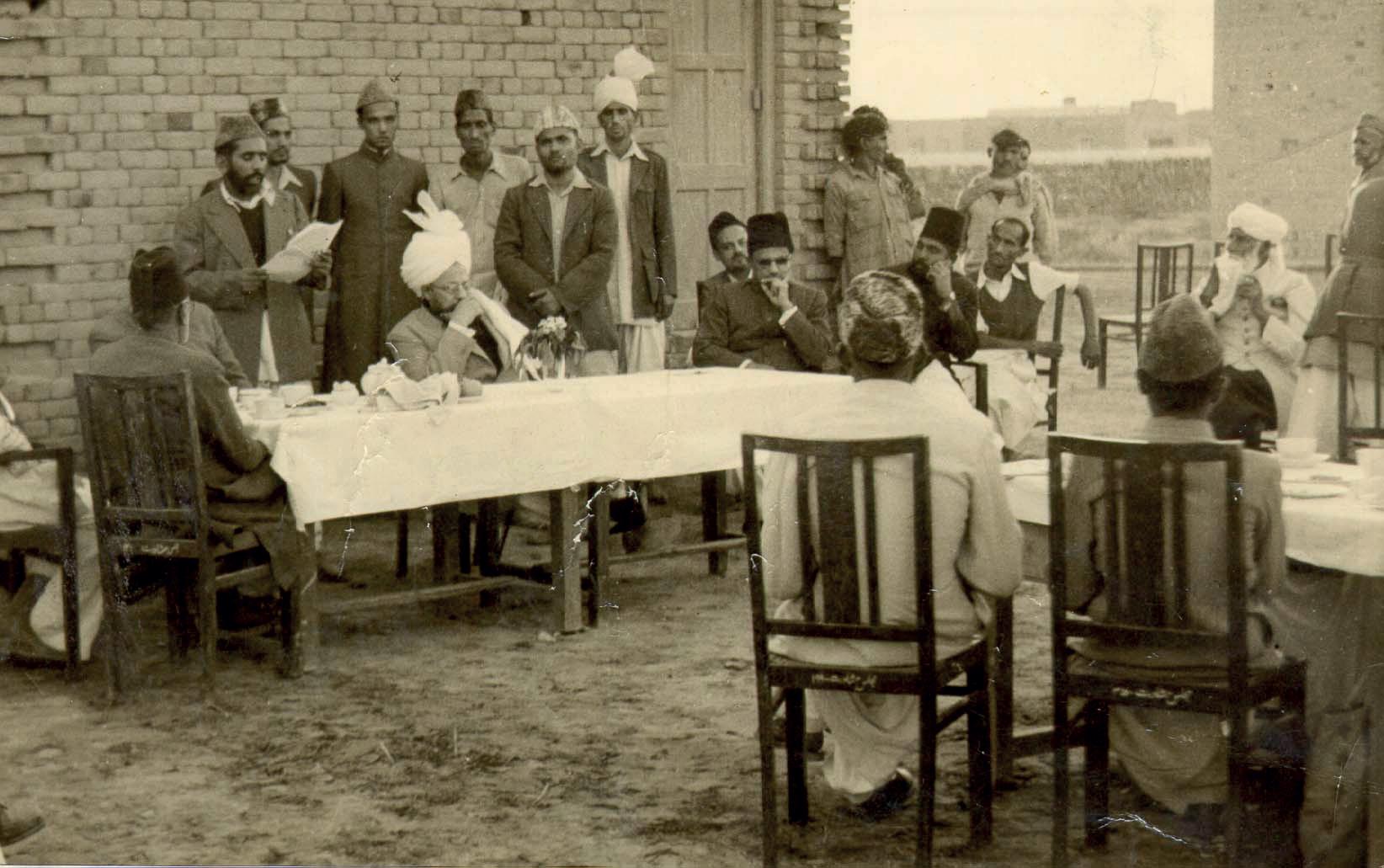
However, they do not know that dreams and revelations are of many different types, and because of their lack of knowledge, people fail to understand them.”
Hazrat Khalifatul Masih enquired from Dr [Attaullah] Sahib what he thought was the difference between National University and Muslim University?
Dr [Attaullah] Sahib said, “The element of religious teaching is more prominent in the National University, while the rest of the education is of the same type. Moreover, they previously had a lot of professors, but now they are leaving. At first, they formed a group for propaganda, but education was also included later on.”
Dr Attaullah Sahib Butt Assistant Surgeon Muslim University Aligarh who along with his younger brother is going to Germany for higher studies came to meet Hazrat Khalifatul Masih II[ra]. They first talked about the current economic condition in Germany, then Huzoor[ra] asked him where he would like to study, in Berlin or somewhere else. Doctor Sahib said that he would go there and then decide. Hazrat Khalifatul Masih said, “Vienna is very famous for its high standard in medical education.” Doctor Sahib submitted that, after completing the two-year course in Germany, he would go there for three months.
Working 21 hours a day Then, they had a discussion about trachoma. Hazrat Khalifatul Masih said:
“Mufti (Muhammad Sadiq) Sahib sent me a prescription. I have benefited greatly from its use and have worked up to 21 hours daily reading and writing in this warm weather without feeling any pain [in the eyes].” During this conversation, the eye condition of Chaudhry Fateh Muhammad Sahib was mentioned. Huzoor[ra] said, “He [Mufti Sahib] told me that his eye condition deteriorated after going abroad.” Doctor Sahib said that Chaudhry Sahib’s trachoma was the worst of its kind.
Hazrat Khalifatul Masih said:
“There are particular times for [the fulfilment of] prayers. When Chaudhry [Fateh Muhammad] Sahib came from abroad, Dr Mir Muhammad Ismail Sahib checked his eyes and told me that it was almost impossible to save one (left) eye of Chaudhry Sahib and the other was also getting worse. I was worried that Chaudhry Sahib is a very experienced person, but the doctor thinks such and such about his eyes. I prayed for him. At night, a person said to me in a dream that his eye was fine. In the morning, I told this dream to Dr [Mir Muhammad Ismail] Sahib and he looked at the [left] eye again and said, ‘One-third of the disease is gone now.’”
Chaudhary Sahib said, “In those days, my eye had a wound as big as a chickpea and up to a distance of six inches, (placing his hand in front of his eye), the hand was not visible from here. I had blurred, watery vision. By that time, my condition was such that every medicine would prove harmful. [After the prayer of Huzoorra], every medicine started working. Now, it is only through negligence on my part that I do not take my medicine on time. The sight of the much-infected eye has become sharper than the other.”
Announcement about the life of a missing person who was considered dead
Hazrat Khalifatul Masih said:
“Like the eyes of Chaudhry Sahib, the same thing happened in the case of Dr Matloob Khan Sahib. When I prayed for Chaudhry Sahib’s eyes, Allah told me in advance that his eyes were cured. Likewise,
the news of the death of Matloob Khan was announced officially and the letters of his associates were also received. A few days before this news, his elderly parents came here [in Qadian]. Though they had other sons as well, I thought at the time [of the news] that he [Matloob Khan] was their only son. Since the news of his death had already arrived, rather than praying, I felt great anguish. At night, I saw in a dream that he was not dead but alive. The next day I mentioned that [dream] to some of my associates. A few days later, a letter came from Dr Matloob Khan stating that there was a misunderstanding about him and he was not dead, rather the enemies had captured him.”
Hazrat Khalifatul Masih said:
“Many truths about dreams continue to be revealed, but people still underestimate them.
“Europeans have done a lot of research on this and have discovered different causes that lead to different types of dreams. For example, if drops of water are sprinkled on the body of a sleeping person who lives by the sea and a candle is lit nearby, he will dream that he was on a boat that capsised and he is sinking, and the sun is shining on his body. On the other hand, if the person is a resident of the interior part of the country, then in the same circumstances, he dreams that it is raining and he is warming his hands by the fire. As such examples are in front of them, they consider dreams to be illusions.
Hazrat Khalifatul Masih asked [Dr Attaullah Sahib], “How can one be satisfied with them [independent universities], because they announce something in public and do something else?” Dr [Attaullah] Sahib said, “The students do not take much part in politics now, though this time Dr Muhammad Alam Sahib has brought some students into it. Moreover, people here in India only study to secure jobs, so independent universities are not established.” Huzoor[ra] said, “The fact is that in independent universities, the authorities do not fully discharge their responsibilities, which are incumbent upon them. For example, the sons of merchants who do not even want to get any job also go to government institutions. They only want to learn accounting, so because the [government institutions] fulfil their duties, they take admission in them. This proves that the people [of independent universities] are incapable of working on their own. There is no question of moderation here, because even moderation has its limits. The people who know something openly say that they have this knowledge.”
[Hazrat Khalifatul Masih said]:
“The way to obtain the ability to work is to acquire good morals first. One can only compete with other nations when their morals are of a high standard. […]”
[Hazrat Khalifatul Masih said]:
“One of the morals required for
government is true tolerance. […]”
A leader must be capable [Hazrat Khalifatul Masih said]:
“[…] Anyone who is worthy and capable of doing something can be a leader in that particular field. The people are already thinking of getting into government. However, they do not even pay attention to what is needed by the government. You [Dr Attaullah Sahib] are a doctor. You know that the lancet is applied where there is a boil, but if the tumour is present on the hand and the lancet is applied on the foot, then what is the benefit of it?
“First of all, the leaders should focus on correcting the morals. Even if a few people achieve good morals, it does not make a difference, because the moral condition of most of the people has not been corrected in general.”
Moral condition of the Germans
[Hazrat Khalifatul Masih said]:
“Look at the Germans, they have been defeated and are in a bad state. However, despite the fact that they are only 60 million, the allies did not dare to occupy their country. Why? The reason is that they know full well that they cannot rule over them because their moral condition as a nation is of a high standard. […]”
Dr [Attaullah] Sahib submitted [to Huzoorra] that, “One should try to acquire such a [moral] state then.”
Hazrat Khalifatul Masih said:
“The Promised Messiahas was sent by God for this reason [of reforming the morals]. This [moral] state has been instilled in us, Ahmadis.”
An exhibition was set up at the Bradford Public Library in commemoration of ‘Islamic Heritage Month’ on 26 October 2022, which was a collective effort of Lajna Imaillah Bradford West, Bradford East and Hadeeqa Ahmad.
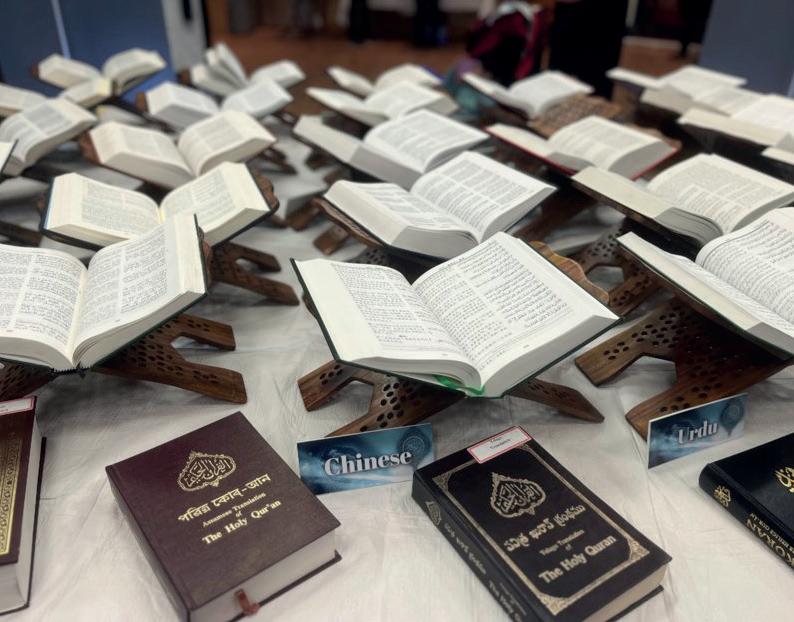
The exhibition included a wide variety of information about the influence of Muslims on various fields of history, science, architecture, art and culture. Translations of the Holy Quran were on display. Arabic calligraphy and traditional hand-made furniture, along with Islamic decor, lamps and utensils, were a great source of attraction and knowledge for the guests. The guests took great interest in the henna application stall. A stall for getting the names scribed in Arabic was also set up.
Free bookstall and The Review of Religions stall displaying literature and periodicals was another point of interest. The stall also featured QR codes, which took the guests to The Review of Religions and alislam.org websites.
The exhibition also included various books and flyers, such as Life of Muhammad, Gender Equality and World Crisis and the Pathway to Peace Missionary-in-charge Canada and the local missionary also attended the exhibition and helped with questions asked by the male visitors.
A total of 22 non-Ahmadi guests attended the event and enhanced their knowledge about Islamic contributions towards shaping the world. Among the guests were Mayor-elect James Leduc, deputy mayor-elect Raj Sandhu, Mayor of New Tecumseth Rick Milne, Shannon Lowe of South Simcoe Police, and the library’s manager of Cultural Services.
Natasha Philpott, editor of Bradford Today, also visited and covered this event.
All guests were given a gift bag that included some books and a mug with the motto “Love for all, hatred for none” on it, as a token of our appreciation for their attendance.
The mayor of New Tecumseth, Rick Milne said:
“Thank you for the invitation to join you and your friends yesterday. I found everyone very nice and friendly. I enjoyed the tour and learned more about your (our) culture. Please feel free to contact my office if there is any need we can provide. Once again, thank you for the gifts.”
Shannon Lowe of South of the Simcoe Police expressed: “Incredibly informative! I enjoyed all the exhibits and learned so much. Thank you so much.”
[Hazrat Khalifatul Masih said]:
“If it is said that some of the Ahmadis are also weak [in morals], then, first of all, I would say that reformation takes place gradually. The second thing is that there are only two or three [bad] examples before people, but I have the entire Jamaat in front of me. Apparently, I am sitting in Qadian but my ears are everywhere. It was said about the Holy Prophetsa that نذا وھ, i.e. he knows whatever is happening around him. In the same manner, we stay informed about what is happening in every place.
“As a matter of fact, members of the Jamaat were shaken by the rift with the Paighamis [otherwise known as Lahori Ahmadis] and the weak among them thought that if the Paighamis could remain Ahmadi in spite of their weaknesses, they did not need focus on removing their
weaknesses. Consequently, they left the Jamaat and joined them. On the other hand, those people whose relations with the markaz [centre] were not strong became weak. However, it is not true to say that Ahmadis are generally not tolerant.
“I visit Lahore and meet people from all walks of life. Sometimes, I do not get any time for myself and people behave unfairly. However, they immediately realise their mistake themselves.”
Dr [Attaullah] Sahib said [to Huzoorra], “You are a model for Ahmadis. All members of the Jamaat should follow your example.”
Hazrat Khalifatul Masih said:
“Every single person should make himself understand this thing.”
(Translated by Al Hakam from the original Urdu in the 9 October 1922 issue of Al Fazl)
A Abdul Aziz Sri Lanka Correspondent
Jamaat-e-Ahmadiyya Negombo, Sri Lanka arranged to visit three Buddhist temples in the nearby area. A team led by the missionary, Tahir Ahmad Sahib presented the Sinhala translation of Life of Muhammad to the Buddhist clergy of the relevant temples.
Another team visited non-Muslim houses and distributed the same book with a brief introduction.
Moreover, a two-member delegation visited the State Ministry of Mass Media in Colombo on 26 October 2022. The ministry officials welcomed the delegation and arranged to meet Hon Shantha Bandara, State Minister of Mass Media.
The minister was presented with the Sinhala translation of the Holy Quran, Life of Muhammad and World Crisis and the Pathway to Peace. A brief introduction to Jamaat-e-Ahmadiyya was also given.
Jamaat-e-Ahmadiya Malta held its 4th Jalsa Salana at the Gonzi Hall, Catholic Institute, Floriana, on 30 October 2022. The Jalsa was held in two sessions. The first session was purely for the local jamaat members and the second session was attended by external guests from all walks of life and communities.
The theme of this year’s Jalsa was “Khilafat, Nizam and Obedience”.
The first session started with a recitation from the Holy Quran, followed by a poem.
Jamaat-e-Ahmadiyya Malta was blessed to receive a special message from Hazrat Khalifatul Masih Vaa, which was read out with its Urdu translation.
This was followed by three speeches on “Prayer: Our identity and hallmark”, “The importance and blessings of financial sacrifices”, “Tabligh: A collective responsibility”, and “Modern societies and means of training”.
After this, a poem was recited, followed by a speech about “The life and character of the Holy Prophet Muhammadsa”.
The concluding speech of the first session was delivered by my humble self, on the theme of this year’s Jalsa “Khilafat, Nizam and Obedience”. This was followed by Zuhr and Asr prayers.
The second session of the Jalsa Salana was held on the theme, “Together for Peace.” The session started with a recitation from the Holy Quran with its English translation. Jaree Ullah Khalid Sahib moderated the session and also highlighted the purpose of the Jalsa Salana.
Ms Mary Gauci, President of Happy Parenting Malta, highlighted the importance of peace within families and also presented three key words to ponder: “me”, “memory” and “meaning”.
Ms Umayma Elamin Amer, President of the Migrant Women Association of Malta, highlighted the importance of peacebuilding within communities.
Mr Bryan Corlett, President of the Universal Peace Federation of Malta, said that if we truly want peace then we must remember that, “peace starts with me.”
Reverend Alfred Vella, a Catholic Priest and the Head of the Marriage Office Archdiocese of Malta, highlighted the importance of interfaith peace and particularly peace between Muslims and Christians and said that peace was possible.
The concluding speech was delivered by my humble self on the topic of “The Holy Prophet Muhammadsa and world peace”.
The session concluded with silent prayer. Over 60 participants, including 31 guests from different walks of life, attended this Jalsa.
After reciting the tashahud, ta’awuz and Surah al-Fatihah, Hazrat Khalifatul Masih Vaa stated:
It is a great favour of Allah the Almighty upon you; the Jamaat-e-Ahmadiyya and those Ahmadis who have migrated to this country in that He has enabled you to come to this developed country. Especially in the last few years, Ahmadis have migrated
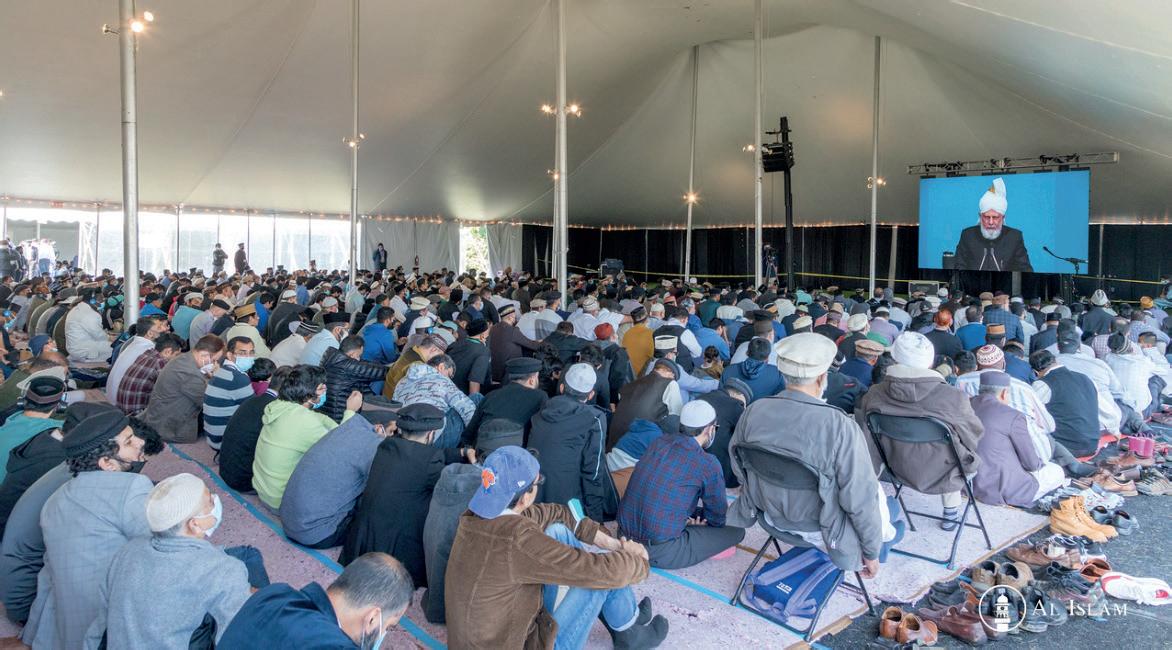
here from Pakistan and are still coming. Those who have migrated from Pakistan are because the conditions for Ahmadis there are continuing to worsen and it is due to this that it has become difficult for them to live there. Therefore, the Ahmadis here
should be grateful to these governments who have allowed many Ahmadis, who were facing persecution, to come and live here. However, the greatest favour that Allah the Almighty has bestowed upon us Ahmadis is that He has granted us the
opportunity to accept the Imam of the Age and the true devotee of the Holy Prophetsa Thus, we cannot express enough gratitude to Allah the Almighty for this. And to express our gratitude to Allah the Almighty is by adhering to His commandments, to
fulfil the rights of His worship and also the rights of His creation. However, this is only possible when we fulfil the due rights of our Bai’at with the Promised Messiahas. This is because, in this day and age, the Promised Messiahas is the guide, who according to the prophecy of the Holy Prophetsa has guided us on the true teachings of Islam.
Hence, every Ahmadi should be mindful of the fact that now it is only through the Promised Messiahas that one can acquire the true teachings of Islam. The reason for this is that the Promised Messiahas is that very individual who, in this era, was bestowed with the understanding and insights of the Holy Quran and who was given the true knowledge of Islam by Allah the Almighty. The Promised Messiahas is that very individual who is a true devotee of the Holy Prophetsa and who desires to morally train his community in accordance with the teachings and traditions of the Holy Prophetsa. Thus, in order to become true Muslims, we must now turn towards the Promised Messiahas and lead our lives in accordance with the path he has prescribed. We must strengthen our faith and have absolute conviction in the advent of the Promised Messiahas and consider him to be the Judge and Just Arbiter [Hakam and Adl]. We must uphold the belief that now it is only by following the path prescribed by the Promised Messiahas that one can follow the true teachings of Islam. Hence, advising those who have pledged initiation to the Promised Messiahas with regards to how they can uphold absolute faith and conviction in him, the Promised Messiahas says:
“A person who proclaims to be a believer must elevate his belief to a state of conviction and deep insight.” One should not only believe, but also develop conviction and deep insight as to why they are pledging initiation.
[The Promised Messiahas further states,] “One should not get entangled in conjectures.” You should not form conjectures in your hearts as to why such and such happened. [Such] questions should not arise. The Promised Messiahas said, “Remember, conjecture can be of no avail. God Almighty says in the Holy Quran Himself:
any grievance in your hearts regarding a decision or action of mine then you should be concerned about your faith. A belief that is filled with concerns and doubts will not produce good results. However, if you have truly attested with your hearts to the fact that the Promised Messiah is indeed the Judge and Just Arbiter then you should surrender yourself, as it were, to his commandments and actions and respect his decisions so that you may be deemed among those who honour and respect the pure teachings of the Holy Prophetsa. The testimony of the Holy Prophetsa is sufficient and he reassures you that he will be your Imam [leader]. (In other words, the Promised Messiahas who shall appear will be your Imam from among yourselves.) He will be the Judge and Just Arbiter. If you are not content with this then when will you become content? This path can most certainly not be a blessed one if, on the one hand, one affirms their belief, but at the same time holds misgivings in some chambers of his heart.” That is, if we outwardly portray that we have believed, but yet develop doubts regarding certain matters. The Promised Messiahas says, “Those who have rejected me and those who raise allegations against me, have in fact not recognised me. However, the one who has accepted me and then raises objections is even more unfortunate as he becomes blind after having witnessed [the truth].” (Malfuzat [1984], Vol. 3, pp. 73-74)
Hence, this is the standard of faith we must all attain. The Promised Messiahas gave the glad-tidings that after him, a system of Khilafat would be established. (Al-Wasiyyat, Ruhani Khazain, Vol. 20, p. 306)
Not only the Promised Messiahas, but the Holy Prophetsa also informed that along with the advent of the Messiah and the Mahdi, Khilafat would remain established until the end of times. (Musnad Ahmad bin Hanbal, Vol. 6, p. 285, Hadith 1896, [Alim-ul-Kutub, Beirut, 1998])
And Khilafat-e-Ahmadiyya is that institution which continues the works of the Promised Messiahas. This is the institution which will uphold the instructions of the Judge and Just Arbiter. In their pledge, every Ahmadi vows loyalty and obedience
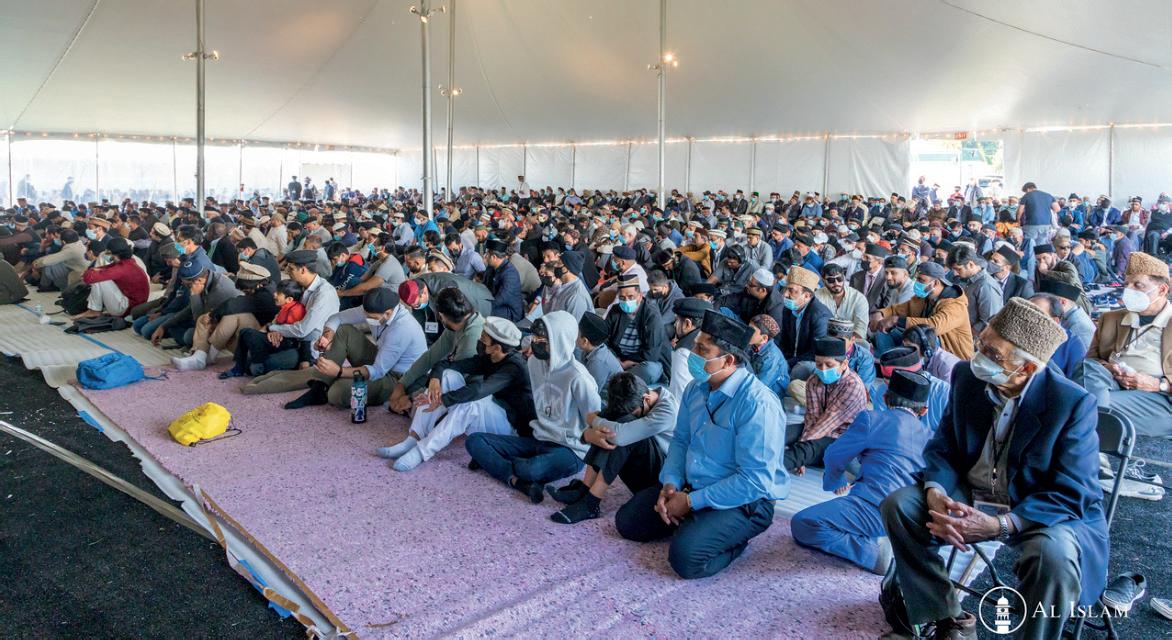
to Khilafat. Hence, from this perspective, it is incumbent upon every Ahmadi to fulfil their oath of loyalty and obedience to Khilafat, otherwise their pledge of allegiance is of no use. Hence, every Ahmadi should constantly strive to increase their faith and level of conviction. Then, whilst drawing his community’s attention towards carefully reciting the Holy Quran, the Promisedas states:
“I have constantly advised those who are associated with me that God Almighty has established this community in order to uncover truths because, without this, one’s practical life will be devoid of any spiritual light.” The Promised Messiahas states, “I desire for Islam’s beauty to be exhibited through practical verities for the entire world and it is for this purpose that I have been commissioned by God. Hence, read the Holy Quran a great deal but not as a mere story; instead, consider it to be a philosophy.” (Malfuzat [1984], Vol. 3, p. 155)
Therefore, everyone must analyse themselves; have we immersed ourselves in worldly endeavours to the extent that we have forgotten the purpose of our pledge of allegiance? The Promised Messiahas states, “God Almighty commissioned me in order to teach and implement the knowledge, understanding and commandments of the Holy Quran. Whoever has pledged allegiance to me should understand this significance and ponder over the knowledge and understanding of the Holy Quran.”
They should strive to understand its meanings and commentary, and this cannot happen until we strive to understand and read the Ruhani Khazain [spiritual treasures] of the Promised Messiahas; until we strive to understand and read the literature he has given to us. The Promised Messiahas states:
“The Holy Quran is not mere stories and fables, rather it is a code of life, a code of conduct which is incumbent upon every Ahmadi Muslim to implement.”
If we forget our purpose after having come to these countries and become immersed in worldly endeavours and we do not strive to shape the environment in our homes according to the teachings
of the Holy Quran, then our children and progenies will become distant from faith and rather than being grateful we would be negating the blessings bestowed by Allah the Almighty. Hence, there is a great need to ponder and reflect on this. Every Ahmadi, whether old or new, those born here or those who have migrated should understand that our fundamental purpose is to obtain nearness to Allah the Almighty, do justice to His worship and to read, understand and act according to His book. It is only then that we can fulfil our pledge of allegiance. Those who migrated here have escaped worldly opposition, however, if they do not act according to the faith and do not possess understanding of the Holy Quran, then they cannot benefit from the blessings of Allah the Almighty. Similarly, new Ahmadis or those Ahmadis who have been living here for some time should also remember that one’s purpose is not fulfilled simply by pledging allegiance. One’s purpose can only be fulfilled when we adopt the Islamic teachings and this will not happen until we read and understand the Book of Allah the Almighty. The Promised Messiahas states:
“I tell you truly that this is a ceremony which Allah the Almighty has created for the virtuous. Blessed are those who benefit from this. Those of you who have associated yourselves with me should absolutely never become prideful and think that you have attained whatever it was that you meant to. It is true that you have attained more virtue than those who deny and have displeased God through their severe opposition and insults. It is also true that you have taken precautions to avoid God’s anger through your positive thinking, however, the truth is that you have drawn near to the spring which God has created now in order to attain eternal life. However, the water remains to be drunk. Therefore, seek the ability to be satiated through the grace and benevolence of God Almighty, because without God, nothing can be done.”
Without the grace of God Almighty, nothing can be achieved which is why one should always seek the grace of God. The Promised Messiahas states:
“Certainly, I am aware that anyone who
‘Surely, conjecture avails nothing against truth’ [Surah Yunus, Ch.10: V.37]. It is conviction alone that can enable an individual to succeed. Nothing can be achieved without absolute certainty. If a person starts to form conjectures regarding every matter, he might not be able to survive in the world even for a moment.”
The Promised Messiahas further states, “He will not be able to drink water as he will suspect it to have been contaminated with poison. He will not be able to eat food from the market as he will suspect it to have been contaminated with a substance that will end his life. How will he then be able to survive?”
It will become difficult for him to live in such an instance. This is a general example and a person is able to benefit from this in relation to spiritual matters as well. The Promised Messiahas said:
“Now, reflect on this yourself and take a verdict from your hearts. If, after having pledged initiation at my hands and having accepted me as the Promised Messiah and the Judge and Just Arbiter, you have felt
drinks from this spring will not be ruined because this water grants life, protects against ruin and safeguards against the attacks of Satan. How can one be satiated by this spring? You must completely fulfil the two rights assigned to you by God Almighty; the first are the rights owed to God and the second are of His creation. Know your God to be One and without partner as you declare through the creed:
“‘I bear witness that there is none who is loved, sought and obeyed aside from Allah.’ This is such a beautiful statement that if it were taught to Jews, Christians or other polytheists and idol worshippers, and they truly understood it, they would certainly never face ruin. It is due to not having this creed that they faced destruction and difficulty and their souls were afflicted and ruined.” (Malfuzat [1984], Vol. 3, pp. 184185)
Hence, observe the manner in which the Promised Messiahas has reassured us and given us the guarantee that if we take benefit from and drink of the water from the spring we have drawn nearer to after having pledged allegiance and accepting him – not just in words but also through our actions – then it is a guarantee that we will never face spiritual ruin. This is owing to the fact that it was the Promised Messiahas who came to further propagate the message of the Holy Quran and the commandments of Allah the Almighty. The Promised Messiahas states therefore, remember that pledging allegiance is not enough, rather Allah the Almighty desires action. He who takes action is never deprived of the grace of Allah the Almighty nor will he face ruin. One is able to develop such a practical state when the proclamation of
[‘I bear witness that there is none worthy of worship except Allah’] manifests outwardly and inwardly. There should be none else more beloved to you than Allah the Almighty, and nothing that you desire more than His pleasure. You should observe absolute obedience to the commandments of Allah the Almighty.
From this, each and every one of us can evaluate ourselves that upon reciting the Kalimah, is Allah the Almighty indeed more beloved to us than everything else and does attaining His pleasure remain our true objective? Are we completely obedient to the commandments of Allah the Almighty? If, at the time of prayer, we are not immediately inclined to offering prayer, and if we do not leave our worldly pursuits and immediately come for prayer after Allah the Almighty has summoned us, then although we recite the Kalimah, there is a hidden tendency of Shirk [associating partners with Allah] in our hearts; our worldly affairs are standing on par with God Almighty. A believer holds such conviction – and should hold such conviction – that “my worldly affairs and work will only be blessed by Allah the Almighty’s grace. How could it be that my worldly affairs come to stand at par with Allah the Almighty’s calling?” If such is the case, then we have not understood the true essence of the Kalimah; we may pronounce a verbal proclamation but our actions do not align with our
proclamation; we may have arrived at the spring but have not extended our hands to drink from it. Thus, the Promised Messiahas stated that if this is your state, then you have not done justice to your pledge of allegiance. The Kalimah Shahadah not only teaches us and instructs us to fulfil the rights of Allah the Almighty, but also steers our attention toward fulfilling the rights of His creation as He Himself has instructed and commanded us to do so. When one fulfils both these rights, only then do they become a true believer and only through this can a true Ahmadi Muslim do justice to their pledge of allegiance. Furthermore, whilst advising those who have pledged allegiance to him, the Promised Messiahas states:
“If you continue to remain absorbed in the world, then there is no benefit to your repentance at my hand. Repenting at my hand is akin to accepting death in order that you are born into a new life.”
In other words, you should undergo a spiritual rebirth after taking the pledge of allegiance. If one does not find a new spiritual life and the same worldly passions and desires persist, then a pledge of allegiance is of no benefit in this state. The Promised Messiahas further states:
“If you do not pledge allegiance with your heart, it will yield no results. In pledging allegiance to me, God desires attestation from your heart. Whoever accepts me with a sincere heart and truly repents from their sins, the All-Forgiving and Merciful God will surely forgive their sins. One enters a state as though they have been delivered from their mother’s womb, whereupon angels safeguard them.” One becomes completely innocent. The Promised Messiahas further states:
“If even a single pious man lives in a village, then on account of that pious man and for his sake, Allah the Almighty protects that whole village from destruction. However, when destruction comes, it encompasses everyone. Nonetheless, through some way or means, God still saves His servants. It is the practice of Allah that even if a single pious person remains, others are also saved on their account.” (Malfuzat [1984], Vol. 3, p. 262)
This fundamental principle should always be kept in mind, that Allah the Almighty hears the prayers of His sincere servants and accepts their righteous deeds. Thus, we should strive to make our worship solely for Allah the Almighty’s sake. Our actions should derive the pleasure of Allah the Almighty. It is apparent from the current condition of the world that clouds of dreadful devastation are looming over us. Yesterday, the American President gave a statement that if the President of Russia makes use of nuclear weapons, then there will be retaliation from the other side as well. The devastation that ensues will result at the end of the world. Therefore, those living in these countries after having migrated here should not be under the impression that they are safe. No one is safe anywhere. When the leaders of the major world powers lose their minds, they do not take any considerations. Thus, in such circumstances, it is the duty of Ahmadis to pray and offer worship solely for the sake of Allah the Almighty. As the Promised Messiahas states, for the sake of pious people, for the sake of His sincere servants, Allah the Almighty saves others as
well. This is what we derive from the Holy Quran, the words of Allah the Almighty. No one should be under the impression that after migrating here, they are safe and that the future of their children is secure. Not at all. On the contrary, we are passing through very dangerous times. If anyone can save us in these conditions then it is only Allah the Almighty. Thus, bow down before Him and teach your offspring to bow before Him as well so that you may protect yourselves and your children. This world will not save us, nor will it secure our and our children’s future. Rather, if we do justice to the proclamation of
[There is none worthy of worship except Allah and Muhammadsa is the messenger of Allah] then Allah the Almighty will save the world on account of our humble prayers and good deeds. These days, offer plentiful prayer in this regard as well before the condition of the world worsens beyond bounds. The Promised Messiahas states: “Virtue is that which takes place beforehand. If one were to act later then it would be of no benefit. God does not accept the virtue which merely springs forth from a natural reaction. When a ship sinks, everyone weeps (when a ship is about to sink, everyone begins to weep, yet prior to this everyone is smiling and laughing). However, seeing as crying and weeping is a result of natural demands, it can therefore be of no benefit at that moment, rather it will only be beneficial prior to this, when there is a state of peace. Know for certain that this is the secret to attaining God, whereby one remains vigilant and attentive beforehand. They should remain so cautious as if they are about to be hit by lightning as it strikes. (If one is alert they will be aware of the lightning striking, and so no matter how many thunderbolts there are, they will not be struck by them.) However, the lightning shall hit and destroy one who sees it and cries out, for they fear the lightning and not God.” (Malfuzat [1984], Vol. 3, p. 265)
Hence, the Promised Messiahas has given us a very clear warning, that one must develop a relationship with God Almighty now. Right now the clouds of danger have begun to form, or at the very least if so willed they can be controlled. But they can also spread at any moment.
Therefore, it is the faith, relationship with God Almighty and prayers of Ahmadis which can save the world from destruction. Supplicate whilst instilling compassion in your hearts for the world. Explain to those within your spheres [of influence] that if we do not turn our attention to the rights of God and the rights of mankind, then this beautiful world can change into one of desolation. Hence, every Ahmadi must strive to fulfil their obligations with this in mind.
Whilst drawing further attention to prayer, the Promised Messiahas states: “Observe how you prepare your fields with effort and hope for some profit, likewise, the days of peace are for hard work. If you remember God now, you shall taste the fruits thereof, even if it seems difficult to attend the prayers in conjunction with all the worldly occupations.”
The Promised Messiahas stated very clearly that with all the worldly tasks it may
seem very difficult to attend the prayers, even more so the Tahajjud prayers. The Promised Messiahas further states:
“However, if one makes it a habit now then they will suffer no more. If you supplicate then that Benevolent and Merciful God will bestow His favours. You carry out your works (i.e. worldly work), you show mercy on yourselves and your households, tend to their needs, show compassion to children, and so as you show them this mercy, there is also another method of doing so (that is to say, just as you show them compassion in a worldly sense, there is also another method of doing so.) What is that method? It is to supplicate for them in your prayers. Pray for them whilst bowing and whilst prostrating that Allah the Almighty averts this trial and protects them from the punishment. One who supplicates does not remain deprived. It is not at all possible for one who prays to be killed like the ignorant impure ones. If this was not the case, then God would never be recognised. He distinguishes between His truthful servants and others. One is seized, whilst the other is saved. Therefore, be sure to fully develop true sincerity.” (Malfuzat [1984], Vol. 3, p. 266)
Even though the Promised Messiahas stated this in that era when the plague was widespread, however, it is just as important nowadays, because as I have mentioned, we are witnessing the signs of global destruction, therefore we especially need to submit to Allah the Almighty, for this is the only way for us and the world to be safeguarded.
The Promised Messiahas also gave special instructions to his community to adopt high morals, for displaying high morals is among the commandments of Allah the Almighty. The Promised Messiahas states:
“Reforming one’s morals is an incredibly difficult task. Until a person reflects over their state, they cannot reform themselves.” One ought to analyse themselves, what one says, how one spends their entire day; one should analyse how they are spending their lives, how they are spending each day and reflect on what good deeds they performed or what ill deeds were they guilty of, what virtues did they do and what evil did they commit. Until one reflects over their own conditions, they cannot reform themselves.
The Promised Messiahas then says:
“Uttering profanities will foster hatred, therefore, always keep your tongue under control.” The Promised Messiahas further states:
“Observe how a person can never harbour hatred for one whom they consider to being their well-wisher. Utter foolish is the person who does not show any mercy to their own soul and places themselves in grave danger by failing to utilise their faculties properly and does not enhance their moral qualities.” (Malfuzat [1984], Vol. 3, p. 346)
It means, wisdom dictates that one ought to nurture the strengths and capabilities bestowed to one by God in such a manner whereby every action is a demonstration of the most excellent morals. If one acts immorally over small and trivial matters, then they place their own selves in great danger. It should also be remembered that on the one hand, Islam emphasises that in personal matters, one ought to demonstrate patience, restraint, forbearance and the
highest of morals as well as abstaining from quarrels, but at the same time, it also urges one to show their sense of honour and dignity for their faith – whilst remaining within the parameters of the law. Thus, whilst drawing our attention towards the sense of honour for one’s faith, the Promised Messiahas says:
“Whosoever announces that they have left the fold of Islam and they utter vile profanities and are a dangerous opponent, their case is different. For example, the companions faced such difficulties and had to listen to the vilification of Islam by some of their relatives. Despite them being close relatives (i.e. those with whom they had familial ties) the companions gave precedence to Islam.”
The Promised Messiahas says:
“A person who is a staunch enemy of Islam and utters vile abuse against the Holy Prophetsa, they are worthy of contempt and to sever all ties with them. But if a person is such whereby they are indolent in their affairs, then one ought to overlook their shortcoming, as they are deserving of this. And one should not put a strain on the relationship they seek to establish.”
(Malfuzat [1984], Vol. 3, p. 346)
If one does not show hostility, then one can maintain ties with them. One ought to maintain cordial ties with them, but if a person is a staunch opponent, and despite repeatedly explaining to them they do not desist in hurling abuse at Islam and the Holy Prophetsa, then in such an instance one ought to show their sense of dignity and honour for their faith. In this manner, every Ahmadi ought to hold a sense of honour and dignity with regard to the Promised Messiahas. Despite explaining to a person, if they still hurl abuse against the Promised Messiahas, then we cannot extend
a hand of friendship to such a person, nor should the sense of pride and honour within an Ahmadi permit them to do so. Many people among you have migrated here from Pakistan. They have first-hand experience at just how vulgar the language is that is used against the Promised Messiahas by the socalled clerics. If we are told to express our love for them or stop ourselves from praying that may their evil return back upon them, then our religious pride and honour do not permit us to do this. The same principle will apply in this case as well, as explained by the Promised Messiahas. At the same time, we do not take the law in our own hands against such people, because this is a teaching of Islam that one should not take the law into their own hands.
Another quality which the Promised Messiahas has mentioned that needs to be adopted by Ahmadis after taking the Bai’at is to instil love for one another and a spirit of brotherhood. Imparting guidance on this, the Promised Messiahas states:
“Our community cannot flourish until we truly have compassion for each other. We ought to use all our faculties to love those who are weak.” In other words, whatever abilities and faculties we have been granted, we should utilise those and show love to those who are weak, instead of displaying hatred or contempt. The Promised Messiahas further states:
“I often hear that when an individual sees another stumble, rather than extending him courtesy, that individual looks at him with abhorrence and disgust.” The Promised Messiahas stated this is wrong. He further stated,
“A community can only be formed when people conceal the faults of one another and treat one another like true brothers.”
The Promised Messiahas stated in a very
heartfelt manner that it is not right for the Community to have internal conflict. The companions instilled true love and brotherhood for one another and thereby became a Community. The Promised Messiahas also expected the same from the members of his Community in that they establish a bond of brotherhood like the companions did. The Promised Messiahas states:
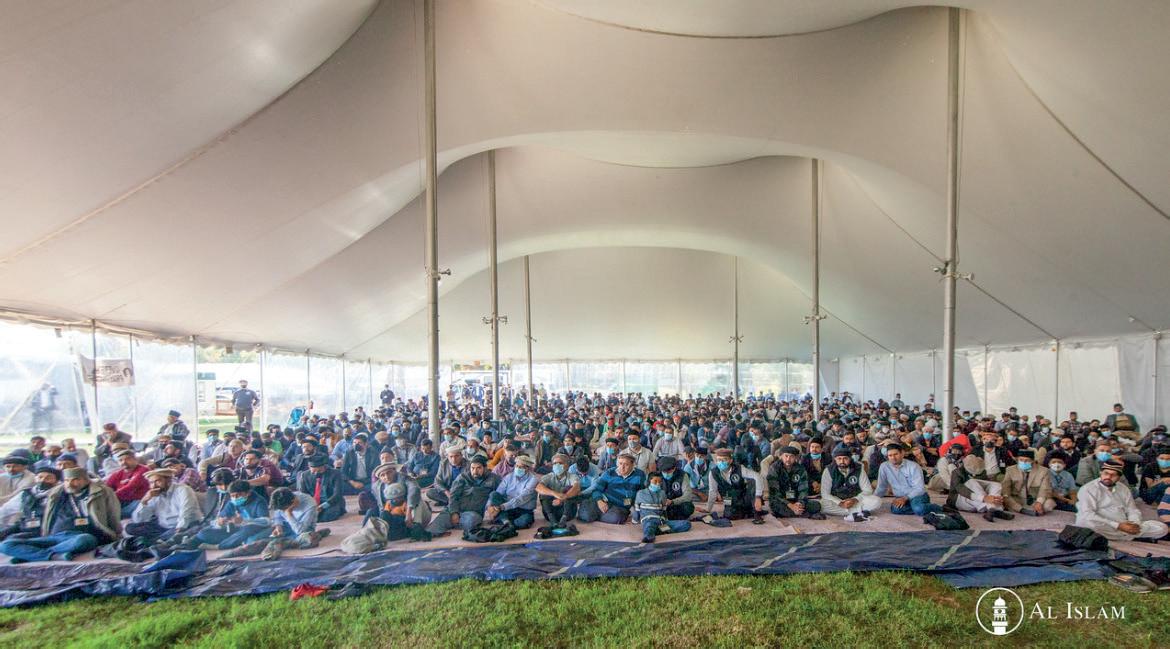
“Allah the Almighty has established this community in the same manner (i.e. just like the community established by the companions) and He shall establish the same spirit of brotherhood here as well. I have high hopes from God Almighty.”
The Promised Messiahas further states:
“To complain about one another, to injure the sentiments of others, to hurt one’s feelings by speaking harshly and to look upon the weak and humble with contempt is a grave sin.” (Malfuzat [1984], Vol. 3, pp. 348-349)
Thus, to be considerate of one another’s emotions is among high morals. When we adopt these virtues, we will be able to fulfil the expectations of the Promised Messiahas and it is only then that we can become the recipients of the rewards which Allah the Almighty has promised to grant the Jamaat of the Promised Messiahas and reap the blessings of Allah the Almighty.
In the time of the Promised Messiahas, people belonging to different tribes and communities from within India were entering the fold of the Jamaat. Now, according to the promises vouchsafed to the Promised Messiahas, people from different nations, tribes, race and ethnicity have entered, and continue to enter the Jamaat from all over the world. Thus, it is a great favour of Allah the Almighty upon people of different nations, race and ethnicity that
has
servant and become united like one people. The Promised Messiahas has drawn attention to the fact that members should become like brothers to one another. The Promised Messiahas stated that though we have different fathers but we share one spiritual father and we are the branches of a single tree. (Malfuzat [1984], Vol. 3, p. 349)
Therefore, irrespective of our race, whether one is white, African American, Pakistani, Indian or Spanish, by entering Jamaat-e-Ahmadiyya we have become the progeny of one spiritual father and no one has any superiority over another owing to their race, ethnicity or colour because we have the same spiritual father. This was the same message announced by the Holy Prophetas in his final sermon. Therefore, if we are mindful of this and work as one and be considerate of one another’s feelings then Allah the Almighty shall continue to grant us success. The Promised Messiahas states:
“Allah the Almighty wants to make our Jamaat as a model for others.” (Malfuzat [1984], Vol. 1, p. 9)
However, can one serve as an example for others through mere superficial words and without any meaningful actions? In order to become an example for others, one has to strive greatly and make great efforts. And we also have to do the same by elevating our standards of worship, reforming our moral conditions and raising the standards of our mutual love and brotherhood. We have to assess whether we are serving as an example for others in this regard. Whilst further drawing our attention towards raising our standards, the Promised Messiahas states:
“Allah the Almighty loves the righteous. Be mindful of the greatness of Allah the Almighty and remain fearful of Him. (In
other words, instil the fear of Allah the Almighty in your hearts) and remember that everyone is the creation of Allah. Do not commit injustice against anyone nor treat them harshly or look down upon anyone.”
The Promised Messiahas further states: “Even if one person in the Jamaat is impure, he will taint the entire Jamaat.” (Malfuzat [1984], Vol. 1, p. 9)
The highest order of sympathy and morals can only be developed when righteousness is instilled in the heart. Advising the Jamaat in relation to this, the Promised Messiahas states:
“It is particularly incumbent upon my community to adopt righteousness, especially in view of the fact that they associate themselves with such a person and pledge allegiance to him who claims to be divinely commissioned. In this way, they shall be delivered from the diverse forms of malice, rancour, associating partners with God, and worldly attachment that may plague them.” (Malfuzat [1984], Vol. 1, p. 10)
The Promised Messiahas further states: “And so, let my community grieve, more than anything else…”
One grieves over so many things in the world, however, the Promised Messiahas states that, “[Let my community grieve], more than anything else over whether they possess righteousness or not.” (Malfuzat [1984], Vol. 1, p. 35)
Thus, if we want to fulfil the due rights of our Bai’at, if we want to become truly grateful for the favours of Allah the Almighty, then we need to constantly assess our conditions. May Allah the Almighty grant us the ability to live our lives according to the expectations of the Promised Messiahas and may we always give preference to our faith over the world. May the fear of Allah the Almighty be instilled in our hearts and may we truly fulfil the due rights of the declaration of:
[I bear witness that there is none worthy of worship except Allah.]
May we join the Jamaat of the Akhareen [who were to come in the Latter-Days], whose glad-tidings were given to the Holy Prophetsa by Allah the Almighty. May Allah the Almighty give us the ability to do so.
Whilst coming here, Amir Sahib mentioned to me that 28 years ago on this very day, 14th October, this mosque was inaugurated. It has been 28 years since the inauguration of this mosque. The Ahmadis living in this area; those who have been residing here for a long time and as well as those who have newly arrived here should reflect upon how much they have progressed in their spirituality. To what extent have they tried to fulfil the due rights of this mosque. May Allah the Almighty enable this mosque to continue serving the people that come here for centuries to come and may He protect it from all kinds of worldly afflictions. However, we can only do true justice to the mosques when we keep them populated whilst trying to fulfil their due rights. May Allah the Almighty give us the ability to do so.
(Official Urdu transcript published in Al Fazl International 4 November 2022, pp. 5-9. Translated by The Review of Religions)
